#or psychological trauma that makes you unable to form connections with other people
Text
if you're my oc you are going to have issues with intimacy (physical and/or emotional) it's not optional
#🐉#when my ocs are born they get a choice: dick dont work (gender neutral)#or psychological trauma that makes you unable to form connections with other people
907 notes
·
View notes
Text
Exploring Mental Health Services: Psychologists in Cape Town

Psychologists play a vital role in supporting individuals with mental health issues, providing therapy and counselling to help them navigate life's challenges. In Cape Town, a vibrant city with a diverse population, there are many psychologists available to help people understand and manage their emotions, behaviours, and thoughts. This article explores the landscape of psychologists in Cape Town, offering insights into their work and the services they provide at psychologists centres.
The Role of Psychologists in Mental Health
Psychologists are trained professionals who specialise in understanding human behaviour and mental processes. Unlike psychiatrists, they do not prescribe medication, focusing instead on therapeutic approaches to help individuals manage and overcome various mental health issues. Whether it's anxiety, depression, trauma, or relationship problems, psychologists are equipped to offer evidence-based therapy that promotes healing and growth.
When to Seek Help from a Psychologist
Many people experience times when they feel overwhelmed, stressed, or unable to cope. While these feelings are normal, when they persist or begin to interfere with daily life, seeking help from a psychologist can be beneficial. If you're struggling with ongoing stress, anxiety, mood swings, or relationship difficulties, it's worth considering professional support. Psychologists in Cape Town offer a safe space to explore these issues and develop strategies to manage them.
Finding Psychologists Near You in Cape Town
When looking for psychologists near you in Cape Town, it's important to consider several factors to ensure you find the right match. Here's a guide to help you navigate the process:
Credentials and licensing: Ensure the psychologist is licensed to practise and holds the necessary qualifications.
Specialisation: Some psychologists specialise in specific areas, such as child psychology, trauma, or couples therapy. Choose someone whose expertise aligns with your needs.
Approach to therapy: Different psychologists use various therapeutic approaches, from cognitive-behavioural therapy (CBT) to psychodynamic therapy. Find a psychologist whose methods resonate with you.
Location and accessibility: Consider a psychologist's proximity to your home or workplace. A convenient location can make regular appointments more manageable.
Compatibility and communication: Building a rapport with your psychologist is key. Look for someone you feel comfortable with and who communicates effectively.
The Benefits of a Psychologists Centre
In Cape Town, many people seek help from a psychologists centre. These centres offer a comprehensive approach to mental health, providing access to a team of professionals, including psychologists, counsellors, and therapists. Engaging with a psychologists centre has several advantages:
Collaborative care: A psychologists centre offers a collaborative approach, allowing different professionals to work together on your treatment plan.
Comprehensive services: These centres often provide a range of services, from individual therapy to group sessions and family counselling, ensuring a holistic approach to mental health.
Community and support: Being part of a psychologists centre allows you to connect with others facing similar challenges, creating a sense of community and support.
Therapeutic Approaches in Psychologists Centres
Psychologists in Cape Town use various therapeutic approaches to help individuals navigate
their mental health journeys. These approaches include:
Cognitive-behavioural therapy (CBT): A structured form of therapy that helps individuals identify and change negative thought patterns and behaviours.
Psychodynamic therapy: This approach explores unconscious motivations and early childhood experiences to understand current behaviour.
Humanistic therapy: Focuses on personal growth and self-actualisation, encouraging individuals to reach their full potential.
Group therapy: Provides a supportive environment where individuals can share their experiences and learn from others on similar journeys.
Family therapy: Involves family members in therapy sessions to foster understanding and improve relationships.
The Future of Mental Health Services in Cape Town
As the demand for mental health services continues to grow, Cape Town's psychologists are exploring new ways to support individuals. The rise of virtual therapy and telehealth has made accessing psychologists easier, offering greater flexibility for those who need support. Additionally, psychologists centres are focusing on preventive measures, working with schools and community organisations to raise awareness about mental health and reduce stigma.
Psychologists in Cape Town provide a vital service for those seeking mental health support. Through comprehensive therapy programmes, personalised care, and a supportive community, these professionals help individuals navigate the complexities of mental health and find their way to a brighter, healthier future.
Dear visitors if you want to more information about Psychologists and our all services please visit our website. We have a website. We welcome you. CLICK HERE
1 note
·
View note
Text
Community traveler: My journey thus far...

Throughout my years of studying and being exposed to clinical experiences, there has been none like this community block. It has not only opened me up to my own flaws and vulnerabilities but also that of the systems within our country.
This block began without any expectations attached because I knew that this experience was going to be completely different and unique as compared to the rest. “we will be therapists who walk the community,” is what I heard. It sounded astounding, the amount of difference we could make. Driving into Cato Manor on our first day, we all did what we were told to do. We looked at the community and saw a child running on the road and immediately asked each other, “ why isn’t that child at school?” the most common example that was made in class.

https://ewn.co.za/2021/08/21/inside-sa-s-soaring-crime-statistics
It is hard to approach a community without any preconceived ideas. Even when you intend to not let those disturbing thoughts win, they linger and influence your actions and reactions. On our first day at Cato Manor, even prior to jumping off the bus we all hid our phones and brought no expensive equipment and accessories because we expected to get robbed if seen with them. Being overly safe and cautious already created a rift between the community members and the students, we stood out and were seen as authoritative figures who never fully trusted them, so how could they trust us?

Another threat to rapport with community members is the English- isiZulu language barrier. It seems pretty obvious that if two people do not speak the same language that they will not be able to form a therapeutic relationship with each other. It goes slightly deeper than that. During health promotion talks its noticed that there are certain medical terms which have no isiZulu translation. This makes it harder to explain the condition or term, or even if service users begin to understand, the complexity of it is hard to remember because it is not part of their everyday language. This often happens when we try to explain the definition of Occupational Therapy and the services we provide, to the public. This lack of insight then translates into our therapy sessions and creates an atmosphere of superiority, where clients are unable to see the benefits of the session, even when explained, because they are struggling to link it to their condition that is barely understood.
Within therapy sessions, Occupational Therapists try to create an atmosphere of mutual respect. Prior to sessions, it seemed to have worked to collaborate and discuss the approach used within the therapy with the client, especially concerning the therapist who will try to bridge the gap with broken isiZulu and the client with basic English. This becomes disrupted as the client is not receiving comprehensive services. One suggested alternative to breaking the language barrier is google translate. However, the translations are not always contextually relevant and may create more confusion for the client. So, using an available, human translator seemed like the best choice.
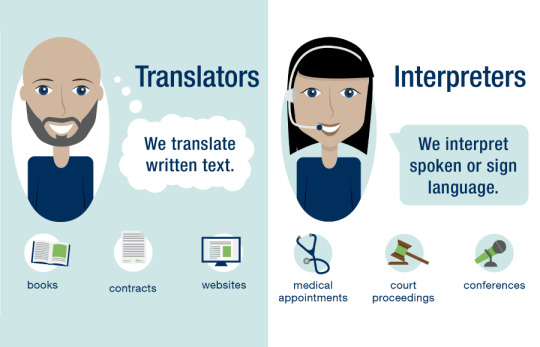
Not prepared for what came next, I began my session in English and basic isiZulu, and it ended with the translator taking over because the client started speaking directly to them and filtered out my unnecessary noise. Understandably I felt disrespected and hurt. It was difficult but I recognized that I could not let my emotions drive my behaviour as I may cause additional psychological trauma or harm. Thereby inflicting maleficence or malpractice. She felt a connection with the translator because she felt heard and received individualized attention that catered to her strengths. Essentially, the takeaway message, is that we cannot control the behaviour and reactions of others, but we can control ourselves, our emotions and reactions to their behaviour in order to reach our intended goals.
Community does have its life lessons and beauty but wish someone had warned to carry, plenty of sanitizer and soap! Not to say that the community interactions made us feel dirty but because sometimes we really need to dig deep. Referring to digging literal holes, in a ground polluted with dirt and decomposing plant materials.
Time, we have everything but time. service users are in a hurry to get to their daily responsibilities, and we must work within that time frame to achieve our goals for therapy. This loss of time is due to long waiting hours in the cue to receive files before therapy, waiting in lines for therapy. all horrors of being short staffed and under resourced at a health care facility. There are so many people that require our assistance and not enough time and student therapists to see them all and address their needs affectively.
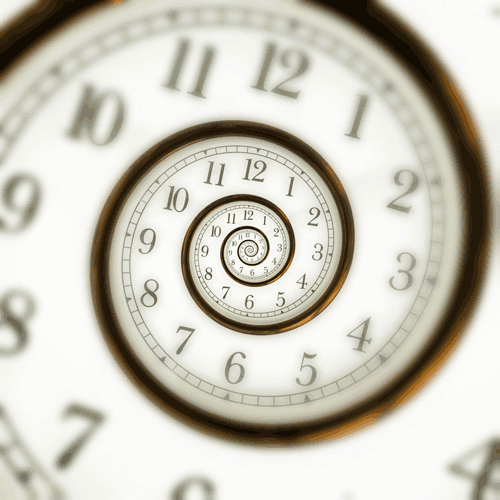
Throughout the block, I have really experienced a sense of guilt and helplessness when being unable to work through external stressors that are not in direct control of the patient. Due to the lack of time and having to pack so much of information into one treatment session as you may never know if you will see the client again to deliver more information, I have felt ineffective as a practitioner. As some of these adaptations go against what we have learnt in varsity for the last 4 years. There is no time for repetition and practice with the client so their execution and carryover of information imparted is slim to none.
In a perfect world, we seek to get rid of the flaws that blemish our society. Whilst I am not saying to concede to the injustices we see before us but our best bet at leaving somewhere better than when we first saw it, is to help people function within it. There is lawlessness and corruption everywhere in the world, it is just more obvious in some places than others. But within those flaws and vulnerabilities, we discover strengths we never knew existed.

References:
Maphumulo, W. T., Bhengu, B.R., (2019). Challenges of quality improvement in the healthcare of South Africa post-apartheid: A critical review. Curationis, 42(1), a1901.
van den Berg-van Antwerpen, Vi. (2016). Still lost in translation: Language barriers in South African health care remain. South African Family Practice. 58, 1-3. doi: 10.1080/20786190.2016.1223795.
0 notes
Text
Erectile Dysfunction and the best Neurologist in Indore to treat it.
Erectile Dysfunction is a disorder that is suffered by many males but very less patients want to talk about it. Any sexual disability is considered a disgrace here and hurts the male ego badly.
More than 10 million males in India are suffering from Erectile Dysfunction disorder. They are diagnosed and it is a huge relief to know that this condition is treatable.

What is Erectile Dysfunction?
Erectile Dysfunction is a condition where males are unable to attain penile erection or sustain it for a long enough time to complete the act of sexual intercourse satisfactorily. Erectile Dysfunction is a chronic disorder that makes the patient unable to get an erection for his whole life.
This condition is a real trauma in a man’s life because it can lead him to believe that he is impotent and unable to do sexual intercourse. It can ruin his married life. But Erectile Dysfunction is not impotence you can know that you are suffering from Erectile Dysfunction, not impotence by observing the following symptoms:
If you have low libido or have lost interest in sex.
If you are suffering from premature ejaculation,
If you cannot achieve an orgasm.
If you suffer from these symptoms for more than two months, you Can be sure that you are suffering from Erectile Dysfunction.

Why should you worry about your Erectile Dysfunction?
If left untreated, it may lead to many other complications: Cardiac complications.
Blood vessel blockage.
High levels of LDL,
High Blood Pressure.
Diabetes.
Parkinson’s Syndrome.
Disturbed sleep.
Multiple Sclerosis.
What can cause Erectile Dysfunction:
Tobacco use in any form.
Overweight.
Prostate cancer and its surgery or radiation therapy.
Any internal injury damaging the nerve connection to the penis
Any surgery in the spinal cord
Any surgery on the nerves.
Alcohol consumption.
Any type of drug addiction.

You have to go visit an erectile dysfunction doctor, or a neurologist, to get treated and cured. He may suggest you some tests, such as blood tests, sonography, or Nocturnal Penile Tumescence tests, to confirm the diagnosis.
It is really heartening to know that Erectile Dysfunction is a curable condition. This condition may be because of several psychological conditions also when you are physically perfect. In this condition, you may have to consult a psychiatrist to get proper counseling to treat you fully and finally.
Sometimes, some medicines may cause erectile dysfunction to you. Medicines for high blood pressure are very common in them. Then the best neurologist may change your medicine or titrate the doses.
Now there are medicines available to improve the flow of blood to the penis. But these medicines should be taken under strict medical supervision.
People should not be ashamed of Erectile Dysfunction if they are suffering from it. In this present-day scenario of high pressure and stress, Erectile dysfunction is a very common complication. You have to have the right erectile dysfunction doctor and the right treatment to get rid of it.
Dr, Shrikant Reddy is a prominent best neurologist in Indore, M.P., who can treat your erectile dysfunction permanently. You can just go to consult him if you are in this area.
Syndication URL on Erectile Dysfunction and the best Neurologist in Indore to treat it.
0 notes
Text
“A Romantic Partner Won’t Complete Me, Because I Was Born Complete”: How Identifying As Asexual & Aromantic Brought Me True Freedom & Happiness | Yasmin Benoit for British Vogue

There is a phase in our lives where everyone seems asexual and almost everyone seems aromantic. It wasn't until puberty kicked in that platonic relationships seemed to take a backseat. My peers stopped wanting to play together and started wanting to 'date' each other. That was when I started to realise that there was something different about me. I didn’t seem to be experiencing the same urges as those I was around. I chose to go to an all girls school in the hopes that – in the absence of boys – everyone would stop caring about sex and dating. It actually had the opposite effect. There was a sense of deprivation in the air and the heightened desire to project their sexuality onto anything and everything.
Therefore, my lack of interest became even more obvious, and it became a not-so-fun game to work out the source of what should be troubling me, but hadn’t been until that point. Having a sexual orientation isn’t just natural, it’s essential. It’s part of being a fully-functional human being. And to be romantically love and be loved by another is the ultimate goal. It’s part of being normal, which made me both abnormal and puzzling. When your asexual, people think there’s something wrong with your body. When you’re aromantic, they think there’s something wrong with your soul. Even for a teenage girl who internalised all of Disney Channel’s “be yourself” messages, it’s never nice to have people publicly debate your supposed physical and psychological flaws.
My nickname in school was “hollow and emotionless.” I was a joker with a decent amount of friends, but I was lacking something crucial, the kind of love that really mattered and the kind of lust that made life exciting...so I was practically Lord Voldemort with braids. I sat through the regular DIY sexuality tests, having my peers show me graphic sexual imagery, have very sexual conversations in my presence, and ask me inappropriately intimate questions to gauge how far gone I truly was. These tests lead to the development of theories, most centred around me having some kind of mental problem. After a while, you start to wonder if everyone knows something you don’t.
When they said that I must have been molested as a child and “broken” by the trauma, I wondered if I had somehow forgotten about sexual abuse that actually hadn’t happened. I looked at some of my own relatives with suspicion, the same people who would later ask me if I didn’t experience sexual attraction because I was a pedophile. It was suggested that I was “suffering” from my “issues” because I was socially anxious and insecure. The suggestion that my ‘issue’ was pathological stayed with me for a long time, but not as much as the widely accepted theory that I was mentally slow. Unfortunately, that one stuck. I was referred to as “stupid” and I started to believe that was the case. It would impact my experience in education for the next eight years, long after I realised that there was a word for what I was.
Asexual.
I first heard the word during one of the near-daily sexuality tests that I was subjected to. I was asked if I was gay, to which I said that I wasn’t interested in anybody like that – men or women. At fifteen, I was asked, “Maybe you’re asexual or something?” but it wasn’t quite a lightbulb moment. How could it be when I had never heard the word outside of biology class? After an evening of Google searching, I realised that there were many people with my exact same experience, complete strangers whose stories sounded so strangely similar to mine. I also stumbled across the word ‘aromantic,’ but at the time, I didn’t understand the need for it. "Wouldn't all asexual people be aromantic? A romantic relationship without sex is just friendship with rules,” I thought.
Either way, my discoveries showed me that I wasn’t alone, but that only half helpful. I now had an identity that no one had heard of or understood. Most didn’t believe that being asexual or aromantic was a real thing, and I doubted it to. I had been taught to after years of armchair pathologisation. If asexuality was real, why did no one tell you that being sexually attracted to nobody was an option? What if it was just an internet identity made up to comfort people with all of the issues that had been attributed to me? I didn’t have to go far down the rabbit hole to realise that asexuality, like many non-heteronormative identities, had been medicalised. What I had experienced as just the tip of the iceberg. As someone who hadn’t been prescribed drugs I didn’t need or subjected to unnecessary hormone tests, I was one of the lucky ones.
My activism would be my gateway to the community. Despite being the ugly friend at school, I ended up becoming a model while in university. I decided to use the platform I had gained through my career to raise awareness for asexuality and aromanticism. It gave me the opportunity to encounter a range of asexual and aromantic offline, it was then that I learned the significance of having an aromantic identity. There are many asexual people who still feel romantic attraction, as well as aromantic people who still feel sexual attraction. They have their own range of experiences, their own culture, their own flag, and like the asexual community, I was relieved to see that they are just normal people. These intersecting communities are not stereotypes. They weren’t just thirteen year old, pink haired kids making up identities on Tumblr to feel special. They were parents, lawyers, academics, husbands, girlfriends, artists, black, white, young, old, with differing feelings towards the many complex elements of sexuality and intimacy. Most importantly, they were happy.
I am proud to be part of both, and I know that while being asexual and aromantic, I am a complete person and I can live a perfectly fulfilling life. Since meeting members of my communities, I’ve become more open about my identities in real life, and a reaction I’m often met with is sympathy. “You must feel like you’re missing out,” “I can’t imagine being like that,” “It must be hard for your family,” “Do you worry no one will want you?” “How do you handle being so lonely?” “You’re so brave and strong,” “What will you do with your life now?” Even in 2021, a woman who isn’t romantically loved or sexually desired by their “special someone” is perceived as being afflicted with some kind of life-limiting condition.
Asexuality doesn't make undesirable or unable to desire others. It is a unique experience of sexuality, not a deprivation from it. Even if it was, there is so much more to life than what turns us on and what we do about it. Romantic love is just one form of love, neither superior nor inferior to any other. Being aromantic doesn't mean that you can't love or be loved, it does not mean you are void of other emotions or capabilities. I am not lonely with my friends, family, co-workers and supporters. I feel confident not when someone wants to date me but when I meet my goals and form worthwhile connections with others. My success isn't determined by whether someone will want to marry me someday. What we want out of life is our decision alone, our sources of happiness should not be defined by our ever-changing, culturally relative social standards. The love of a romantic partner won't complete me because I was born complete. Feeling sexual attraction to others won't liberate me because my liberation is not dependent on other people.
Valentine's Day is on the horizon. It's an occasion that amps up the focus on (and the pressure to achieve) a very specific type of love and sexual expression, one that is actually alienating for people inside and outside of the asexual community. During a pandemic where many relationships have been strained, tested, formed or distanced, it's important to keep the diversity of romantic and sexual feelings in mind. Many expect me to feel annoyed or lonely during this time of year, but I actually feel empowered and excited by the way sex, romance and love are discussed more deeply around this time. These conversations are constantly expanding to become more inclusive for everyone, and that's what we need to see all year round.
https://www.vogue.co.uk/arts-and-lifestyle/article/asexuality-and-aromanticism
#yasmin benoit#valentines day#british vogue#asexuality#aromantic#aromanticism#aroace#asexual#this is what asexual looks like#thisiswhatasexuallookslike
673 notes
·
View notes
Text
On the other hand, and moving away from direct Mechanisms Discourse (which I prefer to not get over involved in tbh but also this ISN'T about that it's just jumping off it) - it absolutely is deeply classist to assume that somebody is illiterate or ignorant because of poverty/assumed poverty, and that's a huge problem. but also I think on a broader social level (at least in the UK) there is an idea in the left that it's classist to acknowledge the connection between poverty and illiteracy, while the truth is that illiteracy is a problem of poverty (poverty not in the sense of just Not Having Money but in the sense of system denial of adequate resources). Poverty doesn't = illiteracy but illiteracy is very much a problem of poverty - not a failure of a marginalised individual but a failure of the system marginalising them.
Adult illiteracy is a surprisingly large issue in eg both rural and urban Scotland, but it's not because poor people are stupid, ignorant or unwilling to learn - it's because schools are inadequate or inaccessible, classes are managed not taught, teachers are stretched thin and schools are underfunded so don't have resources to help struggling students, if you get to secondary school still unable to read and write you're completely locked out of the educational system unless you can access a school with the resources to teach you individually, and because of this, classism and a lack of support, poorer kids are more likely to switch off school as early as possible.
Social geography is also a big issue. In urban areas, schools in poorer areas get bad reputations, so they're underfunded, so they do worse, so they're funded less, etc, until they're a bare minimum of staff just trying to get through the day in collapsing buildings with no resources and five textbooks. Where better-funded schools can afford teaching assistants, 1:1 support for struggling students, decent food provision for kids, follow-up on children in need of support at home, more teachers for smaller classes, maybe counseling and psychological support, maybe Special Educational Needs classes for older kids to work on basic literacy and numeracy to catch up, worse-funded schools have one underpaid unsupported teacher trying to manage a class of 35 kids with wildly different needs. They don't have the resources to help support kids with issues that might affect their schooling, like parental abuse or neglect, trauma, a parent in prison, care responsibilities, hunger, homelessness, neurodiversities that affect their ability to learn in the prescribed way, learning disabilities like dyslexia, physical health issues including visual or auditory impairments...all things that when supported are highly surmountable but when unsupported often end up with children being perceived and treated as stupid, disruptive or evil. The problem then compounds itself because the kids are badly treated which makes them more disruptive and less able to learn, and more and more work is needed to help them which teachers continue to not have any capacity or resources for.
Rural poverty comes with its own schooling issues as well, in that poverty is generally correlated with remoteness. Poor rural communities are often hours away from population centres, so either you have tiny highly local schools serving a handful of families where a single teacher needs to invent lesson plans that somehow balance the needs of 11 year olds and 4 year olds of all abilities, or your kids need to somehow get into town every morning before you get to work, which may mean dropping them off at 6am, having to part pay for buses, taxis or ferries, sending them on their own, or leaving them with friends and family, and realistically the way that often shakes down is that they don't go. You teach them at home, and they may not even exist for the truancy office to know about.
Literacy is also connected to family culture. Both my parents were people with degrees from educated families, and my mum was a full time parent, and the result is that school didn't teach me to read - I was already a confident and enthusiastic reader. Even richer families may hire tutors for small children, pay for extracurricular learning, etc. The poorer a family is, the more likely neither parent is available to spend time reading with their kids, because they're working full time - at that economic level a single income household is almost entirely unviable so either both parents work or there's a single parent working extra hours or they're just exhausted from worrying about the bills and what's sold to them as a personal failure to look after their family.
One thing it's easy to forget is that while people in the UK still do drop out of school in their teens to work, a generation ago it was almost the norm for a lot of communities (especially the children of farmers, miners and factory workers) to have left school well before the end of compulsory education, both because of school being a hostile space and because of the need for an additional income. Now as well as then, a lot of kids drop out to work as unpaid carers, disproportionately in poorer families that can't afford private care or therapeutic support. Literacy aside, generations of leaving school with no qualifications doesn't tend to teach you that formal learning is as important as experience and vocational learning, and you don't expect to finish anyway so why put yourself through misery trying to do well? But it includes literacy. I grew up in a former mining area and a lot of people my dad's age and older were literate enough to read signs and football results, but took adult classes in middle age or later to get past the pointing finger and moving lips. and if you're parents don't or can't read, it's a lot harder for you to learn.
There's a lot of classism and shame tied up in the roots of illiteracy. Teachers and governments and schoolmates will often have vocally expressed low expectations of poorer students; a rich child who does poorly at school has problems, a poor child who does poorly at school is a problem child. They're often treated with hostility and aggression from infancy and any anger or disinterest in school is often treated not as a problem to be solved but as proof that you were right to deem them a write-off. Poorer or more neglected children (or children for whom English is a second language) will often be deemed "stupid" by their peers, and start at a disadvantage because of the issues around early childhood learning in families where parents are overstretched.
Kids learn not to admit that they don't know or understand something, because if you start school unable to read and write and do basic maths when a lot of kids your age are already confident, you get mocked and called stupid and lazy by your peers, and treated with frustration by your teachers. So kids learn to avoid people noticing that they need help. That means that school, which could help a lot, isn't somewhere you can go for help but a source of huge anxiety and pain - more so when you factor in the background radiation of classism that only grows as you get older around not having the right clothes, the right toys, the right experiences, my mum says your mum's a ragger, my mum says I shouldn't hang out with you because you're a bad lot - so again kids switch off very early and see education as something to survive not something helpful.
The same is very much true of adult literacy. A lot of adults are very shamed and embarrassed to admit that they struggle with reading and writing - a lot of parents particularly want to be able to teach their kids to read, but aren't confident readers themselves, and feel too stupid and embarrassed to admit out loud that they can't read well, let alone to seek out and endure adult literacy classes that are a constant reminder of their perceived failure and ignorance (and can also be excruciating. Books for adult literacy learning are not nearly widespread enough and a lot of intelligent experienced adults are subjected to reading Spot the Dog and similar books targeted at small children's interests). Adult literacy classes also cost time and also money, so a lot of people only have the space for them after retirement, if at all.
And increasingly, illiteracy (or lack of fluency in English) increases poverty and marginalisation, and thus the chances of inherited literacy problems. Reading information, filling out forms and accessing the internet in a meaningful way are all massively limited by illiteracy, and you need those skills to access welfare, to access medical care, to avoid exploitative loans, to deal with any service providers, etc. Most jobs above minimum wage and a lot below require a fairly high level of literacy, whether it's office work or reading an instructional memo on a building site or reading drink instructions in McDonalds. Illiteracy is a huge barrier between somebody and the rest of the world, especially in a modern world that just assumes universal literacy, and especially especially as more and more of life involves the internet, texting, WhatsApp, email, and so on - it's becoming harder and harder for people with limited literacy to be fully involved in society. And that means the only mobility is downwards, and that exacerbates all the problems that lead to adult illiteracy.
People who can't read after the age of 6 or so are treated as stupid. People who can't read fluently when they're adults are seen as stupid and almost subhuman. There's so much shame and personal judgement attached to difficulty reading, but the fact that illiteracy is almost exclusively linked to poverty and deprivation is pretty conclusive. Illiteracy isn't about the failure or stupidity of the individual, it's about the lack of support, care and respect afforded to poor people at all stages of their life. Being illiterate doesn't make you stupid - many people are highly intelligent, creative, capable, thoughtful, and illiterate. I know people who can immediately solve complex engineering problems on the fly but take ten minutes to write down a sentence of instruction. It isn't classist to say that illiteracy is caused by poverty - it's both classist and inaccurate to say that illiteracy says anything about the worth, intelligence or personhood of the poor, that it's a result of a desire to be ignorant, or that it's evidence that people are poor because they're stupid, incapable, ignorant or bad parents. The link between poverty and illiteracy is the problem of classism and bigotry, no more no less, and we deal with it by working against the ideas that both poverty and lack of education are a reflection of individual worth.
Illiteracy isn't a problem of intelligence, it's a problem of education, and that matters because education is not inherent. it's something that has to be provided and maintained by parents, by the state, by the community. you're not born educated. you are educated. except more than a quarter of the Scottish population isn't educated, because the system doesn't give a fuck about them and actively excludes them or accidentally leaves them behind.
#idl why i wrote this I'm just very angry about how we as a culture treat adult illiteracy in the uk#which is to say - we don't#we ignore it and think about it as a problem of the past or of other countries#and if we do encounter it we treat illiterate people as uniquely stupid and ignorant#as if it's a personal not systemic problem#26.7% of people in Scotland are either illiterate or have severe issues with literacy#16.4% in the uk as a whole#it's this invisible symptom of deprivation that nobody fucking talks about#less than half of people in prison have basic literacy and numeracy skills#and that's not because only stupid people end up in prison it's because illiteracy is a symptom of the poverty pipeline#and i don't think there's current data on this but I'd guess we're going to see an ongoing dip in literacy rates#correlated with austerity from 2010 on#because child poverty and child hunger in this country has consistently steeply climbed since then#and you don't. learn well. when you're hungry.#and also i anticipate a drop in literacy associated with Covid. it's two years where kids without existing literacy skills#parents who are home and consistent internet access have really been unable to engage with a lot of classes#and teachers have been even less able to offer meaningful personalised support#and two years is SO LONG in early years. being set back two years compared to other students can affect your education your whole life.
29 notes
·
View notes
Text
Yanderes and Entrapment
It has been a really long time since I've written any analysis for yanderes, mostly because I can't really think of anything to talk about, but my recommendation drafts are piling up, so I might as well talk about yanderes and their favorite way to keep someone by their side- entrapment! We'll be talking about both physical and mental/emotional entrapment for yanderes.
Physical entrapment, such as being locked up in a cage, chained in the basement, or just physically being unable to leave the house due to fear are pretty popular in all yanderes, both female, male, and everyone in between. However, from what I can tell trapping someone is a lot more common in male yanderes than it is in females. This is probably due to the fact that males are generally physically stronger, so it's more likely that they'd used their strength to trap the person they love. I'm also going to chalk it up to the popularity of Toma from Amnesia, since he was a huge part in making cages in yanderes more common, at least in the otome spheres. That's of course not to say that females yanderes don't also cage their s/os, but it is a lot less common when compared to male yanderes, which is something that I find pretty interesting.
A lot of the time, physical entrapment comes in the form of kidnapping, which makes sense because usually, their s/o is not keen on being trapped in a basement or a cage (if they're normal), though I'm sure in some cases they'd be okay with it for kinky reasons. Physical entrapment is pretty common for possessive yanderes because they believe that their s/o is their object. If their love is beyond sight from other people, then there's little to no chance that they can be taken away by someone else or have their attention brought somewhere else. A lot of times, I see this kind of trap happen in bad endings of yandere manga, or in some cases very abusive types, and it's usually to "punish" the s/o for talking to someone or trying to cheat. Physical entrapment doesn't have to be necessarily bad for the s/o, however. For yanderes that are more stalker-like, or have a bit more empathy for their s/o, the entrapment is more in the form of making a palace for the s/o that they can't leave. This has more benefits to the s/o's state of mind as it's usually done in a way that often makes the s/o less likely to rebel against the yandere. Usually, in these cases, the yandere wants to protect the s/o from something and thus tries to make it as comfortable for the s/o as possible. The s/o usually ends up suspecting something but will often be distracted by the things inside of the palace and are less likely to rebel if they feel that the yandere is doing this for their sake. Mixed in with manipulation, it can also make them feel guilty in the process.
Physical Entrapment often comes in the form of violence, which, while unfortunate is pretty common when it comes to yanderes. Whether or not they want to hurt the s/o or not, physical entrapment usually requires at least a little bit of force on the yandere's part, especially if they are reluctant or fight back. In worse case scenario, they could cause the s/o to be unable to move, somehow damaging their spine, breaking their legs or arms or even worse, killing them. Obviously, in terms of the yandere, it makes it a lot easier to keep an eye on the s/o as well as less worrisome for the s/o to escape. Of course, depending on how willful or vengeful the s/o is, it might just make it more difficult for the yandere, especially if they were able to break out. It would be very interesting to watch the s/o break out and struggle with whatever injuries they have, and come back to the yandere with a burning vengeance. If the yandere has some sympathy over the s/o, they may feel guilty for hurting them and try to remedy it by begging for forgiveness or trying to treat them. If the s/o is good at manipulating the yandere, it might end up with the yandere feeling so horrible that they let the s/o go. In some cases though, the yandere might only notice what kind of horrible things they've done to the s/o when they're completely broken. By that point, it's already too late and they may feel despair over what they've done and either end up killing themselves or becoming so deluded that they believe that their s/o is still alive. Physical entrapment like this is usually done for the sake of horror, either some sort of bad ending for the s/o, or something that the s/o has to try to escape from. For instance, in the manga Kedamonotachi no Jikan the s/o is kidnapped by the yandere and has to face not only being raped but being stuffed in a box for most of the day. The story shows the kind of psychological trauma that both characters have and shows their strange relationship with each other. Whether or not the female s/o will escape or even want to escape is another question, but it does show an interesting cause of what a story is like when it focuses heavily on the kidnapping. In an inverse story, it might be interesting to see a version where it initially seems like the s/o has kidnapped the yandere, but we see that the yandere is actually the one trapping the s/o without her knowledge.
The other way of trapping someone is with emotional entrapment. Usually this comes in the form of manipulation, though the kind is dependent on the yandere itself. A lot of times, these kinds of yanderes tend to be more obsessive than possessive, either because they're lacking the strength to properly kidnap someone, or they're more likely to talk their way into someone's heart. Either way, these kinds of yanderes are much likely to be emotionally intelligent and can very easily get their s/o to do what they want. If they are able to manipulate their target correctly, they won't even have to do anything and will eventually train them to do what they want. For the s/o, it often comes in the form of separating the s/o from their loved ones, whether it be friends, family, pets or mentors. It could be in an emotional way, perhaps causing a huge incident that showers the s/o in a bad light, or bringing up bad scars that push the s/o to become angry over something or just simply murdering them. Obviously, depending on the emotional strength of the s/o, it may be more difficult or easier to break the s/o depending on how well adjusted they are. I imagine s/os that are more well adjusted are harder to break or convince since they're a lot less likely to just simply be with the yandere and cut off connections with others. It's very likely it will be incredibly hard to push this kind of s/o to the brink. On the other hand, if the s/o is very fragile emotionally, it would be much easier to force them to become dependent on the yandere. By trapping their mindset to believe that everyone is against them, nobody cares about them, and/or believing that other people aren't worth being with, the yandere is able to trap them mentally with them. Now of course, the yandere might be a little bit more heroic if they were simply extremely protective. If the yandere believes that the s/o would be harmed in any way, for instance, the s/o has a history of being hurt, running into danger, being kidnapped for power, cursed, or is destined to die early, then the yandere might become extremely paranoid over who the s/o may be with and might try to convince them that the only way to stay safe is with them. Whether or not that's actually true or that they even believe it is another story, but it is in essence, another way to try to push them to the edge.
Anyways, sorry for such a long lull when it comes to recommendations. Mangadex is currently still down, so a lot of my manga access is still frozen. I'll still be on Mangago finding some new things though! Thank you for reading this analysis.
49 notes
·
View notes
Text
Writers really did Blair dirty in s5
*super long post because I’m angry as hell*
There was a time when I thought that season 5 is overhated. I’ve been telling myself that sure, Blair is acting unlike herself but that’s because this season is looking at her from more psychological angle and it’s looking at her character more deeply.
But then I’ve rewatched it and I’ve realized that they’ve ruined Blair completely. The depth that I was seeing is in maybe 3-4 episode and is often overshadowed by other things. And usually the deep moments are happening through other characters.
Blair in s5 is barley her own person, she does nothing that isn’t related to her relationships, she isn’t working on her status, position, career. Her whole character arc is regressed to her trying to figure out which guy should she choose or how to make the relationship she is in work.
I mean come on even Nate and Serena have bigger stories and actually do things outside their relationships.
Blair barley ever even makes her own decisions, someone else makes them for her or has to push her to make them.
In other seasons her love life is a big part of her story but in the same time she is doing something else as well.
In s1 she is trying to build her position in school, in s2 she is fighting for Yale and her position in school, in s3 she is trying to figure out her life at NYU and trying to build her position outside high school, in s4 she is going to Columbia and trying to start a career, even in s6 despite its ridicules soap opera like plot she is building her career.
And in s5? Let me tell you what Blair does in each episode of season 5
Recap of all of the episodes
05x01 Blair returns from Monaco, and the whole episode we see her trying to be able to plan the wedding. Wait is pregnant? No it’s Dorota, joking Blair is pregnant too
05x02 Blair is trying to hide her pregnancy from the royal family, while Beatrice and Dan are snooping. That’s all.
05x03 Blair is trying to figure out who is the father. Of course she can’t makw the decision on her own so Dan needs to force her to do it because of course she can’t do it on her own (still very nice friendship moment). I like ending of this episode, it’s deep and sad and emotional. And tells a lot about her mental state and what is going inside of her.
05x04 Blair is trying to convince Louis that Dan’s book is just a fiction, she is angry because the book threatened her relationship, not becuse it affected her career like in Serena’s case, not because she didn’t like the way she was portrayed like Nate and Rufus, it just that it made her fiancé doubt.
05x05 Blair and Louis tell their family about the pregnancy. Eleanor is unhappy (the only one that has a normal reaction) but then they have a beautiful mother and daughter moment but it’s a moment of Eleanor’s depth not Blair’s. Oh and also Blair is pawn in the battle called “where should they live? Which grandma will have more to say?”
05x06 Blair is trying to choose her bridesmaids (entertaining episode and shows her power, still resolves around her relationship). Probably one of the the very few were she is actually doing something.
05x07 Blair is trying to provoke Chuck to show that he hadn’t really changed. And Chuck and Dorota have to form a plan to make sure she believes he didn’t because she will be more comfortable with her relationship with Louis, again it’s not Blair making the decision someone else has to make it for her.
05x08 Blair has a bridal shower. The trouble is Serena is making it seem it’s not like Blair would like it so she is sad, but no it was a lie she has a perfect suprise party, oh and Louis is a jerk and wants to make her believe her friends aren’t her friends. She takes a break from Louis (good for you girl)
05x09 Blair is following Chuck because he had changed and she wants her fiancé to change as well. One of the lowest moments, Blair is absolutely heartless and selfish in her plan. (A very deep scene in the end but it’s coming from Chuck and just happening to Blair)
05x10 This episode I like it’s actually very deep. We are exploring her fear of being alone and her trying to figure out what’s the best thing to do. If she should listen to her heart and choose Chuck or if she should listen to reason and stay with Louis. We see Dan understanding her and trying to help her. That’s a real good episode.
05x11 Another deep episode exploring Blair’s trauma after the accident. Not gonna say anything bad about as I actually like it and here I think the focus on her being unable to stand on her own is important. And her losing her real self is actually very undrstandble here.
05x12 Blair has a bachelorette party and everybody is able to outsmart her and out plan her and Blair doesn’t see a thing. She needs others to save her because again she can’t do anything on her own. Oh and Chuck is following her.
05x13 Blair is getting married, this episode has some depth and action but again Blair does nothing on her own, Eleanor, Chuck, Serena, Louis talk to her and she just responds. But in end she wakes up and tries to run away. Finally she make her own decision.
05x14 Blair is running away from her wedding, Dan is helping her, Serena and Chuck are looking for her. But in the end Blair has one big moment when she takes responsibility and decides to stay in the marriage, doesn’t allow Chuck and her mother to buy her out.
05x15 Blair is back in the city for Valentine’s, goes to the party at Chuck’s place forcing him to leave his own party, she is followed by some woman with the most annoying accent. She is trying to play a cupid, Dan kisses her, Serena is mad, Blair is trying to explain it. The end
05x16 Blair is trying to convince Serena there’s nothing going on between her and Dan. She finds out what’s in a book and realizes Dan has feelings for her. So she decides she may want to start the relationship so she kisses Dan in front of Serena as her grandmother is dying. Sure Blair is doing things but that’s all relationship related, she is not even yet divorced and she is already thinking about going into another relationship.
05x17 Blair thinks she maybe able to get out of her marriage and be able to be in a new relationship, turns out no, she goes to Cece’s wake. She finds out about the video,Chuck and Dan fight for her, she tells Chuck she can’t be with him right now, photo of her and Dan gets out, meaning she will need to divorce and pay dowry. But Georgina says she might be able to help her out.
05x18 Blair tries to have sex with Dan and tries to be able enjoy it so she gets drunk. That’s honestly the whole plot of her story in this episode. (The worst episode in the whole show)
05x19 Blair is about to sign divorce paper, refuses to talk to Chuck, Dan is worried about the papers and tells her Chuck paid her dowry she accuses Chuck of trying to buy her, he tells her she was never meant to find out, she is sad because of the fact she will no longer be in the royal family. She doesn’t come to the conclusion that she can be strong without the title, she needs Dan to give her he fake princess moment where she is basically a tourist attraction.
05x20 Blair is trying to organize the party that will launch her and Dan’s relationship. Party is ruined because of the drama of other people. That’s it
05x21 This episode where Blair is actually doing something related to her social status. But she does it by trying to sabotage her boyfriend’s event? Very grown up.
05x22 Now we are getting to episode where she actually does something. She reunites with her friends as they try to figure out the whole Elizabeth and Jack thing. We finally see her do something outside her relationship. Of course at the same time Dan is worried and follows her outside the city. And lies to her about Rome.
05x23 An interesting episode, again Blair is actually doing something but it’s still connected to her love life. Blair is trying to help Chuck but at the same time she should be with Dan taking to the guy from the program. So she is torn. But at least she is scheming and using her talents.
05x24 Blair has to finally choose between Chuck and Dan while her secrets are being published on gossip girl and she tired or stop it. Finally she talks about her future outise love life but it’s Eleanor that starts the conversation.
That’s all she does, every single scene is related to her love life, she has no plans, no aspirations. Until the very last episode we don’t hear her talk about her work related plans and even then she talks about the matter of her heart. In season 5 Blair isn’t her best self, she doesn’t do a thing. Things are happening to her but she isn’t making them happen, she is just responding to them. And they related only to her love life. Gone is the girl that wanted to be a powerful woman, she doesn’t want a thing, even after she got divorced and is with Dan. She doesn’t talk about her plans, the closesest to her talking about future is when she talks about it is when she is wondering is she wants to go with Dan to Rome, on his writing program and when she decides to do it she is planning the trip, on where they will be eating and what will they be seeing. Not even for a moments she thinks about her future, about what she wants to do.
Blair in season 5 is a shell of a character, regressed to the love triangles, she is woman that does nothing outside her love life. So in conclusion, season 5 is the worst when it comes to the way Blair was treated. She is so much more than her love life and in s5 they completely they forgot that. And yes it’s a season of very big growth to her as she is faced with crushing realization that fairytales and movies are not real, that reality is brutal. But that’s not how you do it, multiple characters have a character growth in this season and yet we see them actually do something not just wonder which guy should she choose and not the end waiting for someone else to choose for her.
It’s an emotional season but again thoes emotions and depth are in few episodes and are usually are not really coming from Blair. More often it someone else’s growth and understanding of her that is creating thoes moments.
#gossip girl#blair waldorf#chuck bass#Dan Humphrey#serena van der woodsen#nate archibald#Louis Grimaldi#eleanor waldorf#overthinker#tv show#cw show#tenen drama
14 notes
·
View notes
Text
Raising personal frequency and why it matters.
I am not a love and light person. As in we must be positive all the time and negative feelings can’t exist. No. As someone who can literally feel a persons energy, I will say that negatively charged energy has a heavier feel to it. You literally can feel the density in the air in a room shift when an extremely negative person walks in. There is some truth in all programming. Even in psychological operations like the new age movement. The new cage movement. Earth is a realm of duality; good and bad exist here. In a realm of duality, the goal is balance. One must innerstand darkness does exist in all of us and that is ok! Too many people want to pretend darkness doesn’t exist and by ignoring evil, it grows. Don’t let the darkness control you. Anyone pushing that we have to make the darkness go completely away or that it shouldn’t exist is misinformed and I would be cautious listening to advice from said person. I would be leery of anyone attempting to tell another how to live. Pushing your will on another is the definition of black magic. With anything I ever discuss, if you don’t agree that’s cool. I’m always open to hearing new ideas and perspectives; please don’t approach me in a nasty manner. I won’t engage someone unable to have an calm conversation. Engaging and regularly interacting with negativity or negative people is a good way to lower your own frequency. We often tend to carry a frequency similar to our friends, this is why so many outgrow friends after having a spiritual awakening. We literally outgrow people on an energetic level. 
Raising personal frequency is important. Lower vibrational energies literally cannot affect folks on a higher frequency. I made a conscious effort 7 years ago to change who I was. A girl in a rehab therapy group told me about myself and I did not like what I heard. She said I was one of the most negative people she had ever met and as I began to examine my behaviors and my words, I realized she was right. It took a couple years of conscious effort to change my mindset from negative to positive. I can say today the results have been priceless. I am very appreciative of her giving me a wake up call.
If what we are told is correct and atoms are in fact what compose matter; everything in this universe is sound. Atoms are said to be made of waves and vibrations. At the molecular level atoms don’t actually touch. Atoms get extremely close to one another but they never fully touch. They’re independent energy fields and when densely packed together atoms form matter. Matter is dense....which goes along with my observation of negatively charged energy being heavier. Higher dimensions are said to be heavenly and they also do not have dense physical matter. I’m not entirely certain that physical existence isn’t a prison for the spirit. Our bodies are made of cells, prisoners are put in cells. It is blatantly obvious that those in control of this realm would like humanity on the lowest frequency possible. One intention of mind control programming is to lower the frequency of mankind, keep man in a angry, fearful, depressed, lower vibrational state. It is highly likely there are malevolent beings harvesting humanity’s soul energy. This energy is called loosh. All emotions create loosh; for some reason negative emotions generate more or more desirable energy.
The negative humans and other unseen beings/energies who have been in control of this realm for thousands of years now feed on what is known as loosh. Loosh is the life force energy created by humans when they experience emotions. Low vibrational emotions such as anger, sadness, depression, and even apathy are preferred by these negative energies than the loosh generated by positive emotions. Feeding these malevolent energies is why so much programming is done to divide the people, to make us hate our lives and ourselves, to blame mankind for the evil here, and many other trauma based mind control tactics are in place to keep humanity in a lowered state of existence. There are individuals who feel a deep seeded guilt in the heart just for being born due to this programming! The moon is thought to be emitting a low frequency in order to mind control humanity. Hence why when at full power a.k.a. a full moon humans act crazier and even violent. A full moon is when the Saturn moon matrix broadcasts the strongest signal.
If you are a person who has discovered that evil is running this realm, the best thing you can do is to do the exact opposite of what the controllers want; work on making your life peaceful, exposing the evil, healing your trauma and reprogramming yourself, disengage from the “matrix” every way you can. Be mindful of where you spend money, try not to use money, watch your words, push out negative thoughts, and love yourself. Anyone “awake” should absolutely strive for a higher frequency, honestly everyone should strive for a higher frequency. Existence is much more enjoyable and calmer when you are on a higher frequency. The law of attraction is legitimate. We attract back to us exactly what we put out into this world. Putting out positivity attracts pleasant situations and focusing on negativity creates unpleasantries.
Extremely high and extremely low vibrations do not mix, they tend to separate themselves from one another instead. Society is currently being divided. Those who are fearful are going one way and those of us who want unity are going another. How this ultimately will play out, time will tell.  
Sleep paralysis is potentially based solely on frequency. Sleep paralysis occurs when your frequency is too low. I’ve heard folks say sleep paralysis is necessary for astral projection; that is not true. Sleep paralysis is unnatural and caused by a weapon of some kind. A frequency weapon. Those on a too high frequency cannot be manipulated by such technology.
In my opinion being on a higher frequency is better is because you have access to more spiritual information and any metaphysical ability you possess functions exponentially better on a higher frequency. When my frequency goes too low, certain abilities vanish. Frequency fluctuates regularly. It typically stays in a a range normal for you, but extraordinary events like a crisis or confrontation can dramatically drop one’s frequency; it can take days, weeks, or even months to recover from some circumstances. Recognizing how important frequency is and learning how to raise your frequency are important to spiritual development. When on a higher frequency you have a better connection with your intuition, are less susceptible to mind control programming, and psychic attack.
How to raise frequency.
Meditate regularly - at least three times a week for 15 minutes to start
Spend as much time as possible outside in nature
Daily Grounding/Earthing. Walking barefoot on the earth for 15 minutes every day. Weather permitting.
Positive thoughts, actions, words, and deeds. Developing positive mantras to repeat throughout the day is helpful.
Breath work
Engage in as little conflict and negativity as you can.
Avoid alcohol and prescription drugs.
Don’t be too serious or have too many expectations for this will create resentments. Events will never unfold as we expect them to, people are much better served by going with the flow and observing how events unfold as they happen; don’t anticipate events ahead of them occurring.
Work on conquering fears. Especially the fear of death.
Practice compassion, empathy, and kindness towards everyone. Humans are equal; one isn’t better than another. Our life choices and luck is often the only thing that separates us.
Laugh
Exercise. Make sure you do something you find fun, not something you dread. Any kind of physical activity where one is having fun will raise his vibe. Dancing is a personal favorite.
Take a break from technology
Be mindful of how much time you spend on technology. Put the phone down during dinner or when you should be engaging with the people literally in front of you.
Wear and decorate with crystals. Black tourmaline and obsidian are good for negativity.
Decorate with high vibrational plants jasmine, aloe vera, or a snake plant
Be mindful of what information you watch and listen to. Movies, TV, music, social media, etc. It is best to just turn off the TV for good. Television is a weapon. Be very conscious of what information you allow to enter your mind.
Minimize interaction with toxic people. Keep conversations short, topics shallow, and have an exit plan if at an event where the environment may get unpleasant. For example drive your own car, have a friend or the babysitter call and oops I have to go….boundaries to protect your energy aren’t bad.😉
Thank your food for its life and sustenance prior to consuming it (plant or animal.) Doing this changes the food into higher vibrational intake.
Regularly cleanse negative energy from your personal spaces. Energy cleansing methods are decluttering, letting fresh air and light in, clapping loudly in the corners of a room to move stagnant energy, smudging, epsom salt baths.
Aura cleansing, visualization, cord cutting meditations
The above tips will have a positive effect on your frequency. Remember your thoughts create your reality and you get back what you put out into the universe. If your thoughts are consistently negative be prepared to have negative experiences. If you are hopeful, have faith in your ability to manifest & the universe’s ability to make things happen for you, have generally positive and laid-back nature, you will reap great rewards and experience feelings of happiness, contentment, and abundance.
I feel it is obvious by the state of the world today that humanity has been in a very negative state of mind for quite some time. There are millions of us (if not billions) that are here to change this reality, not to adapt to it. We have been called Starseeds, indigo children, and light workers; regardless of label the intent is the same - to create a positive reality on earth, to rid this place of evil, to liberate humanity from enslavement, and teach them a new way to think. We are here to help humanity realize humans are powerful creator beings and these powers have been stripped away by literal genetic manipulation. It is time for the devolution of mankind to end and for humanity to begin ascending back to the higher dimensional consciousness we once were.
2 notes
·
View notes
Text
Doctor Takuto Maruki Was Right

Maruki is the Councillor Arcana in Persona 5 Royal and is a fantastic character that the original game was sorely lacking. I’ll be talking some spoilers here. Be warned.
We can talk about how Demiurge/Yaldabaoth/Yagor/Jägermeister (or whatever you want to call him) is straight trash and shouldn’t be the overarching antagonist of Persona 5 another time, but that’s not what’s important here.
What’s important here is that Maruki wasn’t in the original game and that does a disservice to everyone who played it.
For the vast majority of P5R, Maruki is just the high school counselor who was brought in to the school in the aftermath of the Kamoshida incident as a means of damage control. He’s kind, emphatic and insightful and genuinely wants to help anyone seeking his services.
The Phantom Thieves, due to their involvement in the Kamoshida incident are mandated by the school to talk to him; as the game progresses, most of the team members form some sort of connection to him, save for Akechi and Futaba (I believe) as Akechi is only a Phantom Thief when his goals align with the team and Futaba isn’t a student.
Even Yoshizawa and Yusuke interact with Maruki, as Yusuke goes out of his way to do so after hearing about him from the other thieves and he was Yoshizawa’s counselor after the death of her sister.
Over the course of his confidant, Joker gives Maruki his perspective on some of Maruki’s research, which is later revealed to be Cognitive Psience. At the end of his confidant arc, Maruki reveals that he’s known that Joker’s group were the Phantom Thieves since he saw them exit the Cognitive world during the first heist. He says he supports the thieves and their justice but he has to go a separate way. He then exits the story until after the defeat of the God of Control.
If you finish Maruki’s Confidant Arc by the time that he leaves the school, Maruki completes a belated Cognitive Psience paper that he was working on with funding from a college in Toyko and winds up applying his theory when Mementos merges with the real world.
In short, Maruki fully awakens to his persona with the special ability to rewrite cognition. When the cognitive world and the real world are merged, however this power becomes absurdly potent, and Maruki begins to warp reality in order to make a world where no one suffers.
Maruki’s machinations affect all of the Phantom Thieves positively: Joker doesn’t go to prison because... Akechi is alive and confesses to his crimes in Joker’s stead. Akechi is let off the hook for his crimes. Morgana is a human. Ryuji was never injured and is still the star of the track team. Ann’s friend Shiho never attempted suicide. Yusuke was never exploited by Madarame, who instead acts as a passable father figure to him. Makoto and Sae’s dad was never assassinated. Futaba’s mother is alive and is presumably in some sort of relationship with Sojiro. Finally, Haru’s father wasn’t executed after his bossfight and he was never an exploitative egoist.
There’s a lone exception to this: the girl who the game refused to let join the Phantom Thieves; a girl who had been receiving therapy from Dr. Maruki since before the start of the game due to her trauma from the death of her sister, Sumire Yoshizawa.
In a way, “Kasumi” was Maruki’s prototype for the world he wanted to create. She couldn’t process the guilt she felt for surviving the crash that killed her allegedly more talented sister and consequently wished that she was her late sibling.
Now the world that Maruki creates is essentially a utopia, where no one suffers and crippling psychological harm is unable to befall anyone. Now we can consider the value of free will that Maruki is removing by becoming a new “God of Control”, but as a card carrying deterministic nihilist, I see it as more or less as trading the whims of an uncaring chaotic universe for those of a benevolent eccentric. The game frames this as a stagnation of humanity, something I don’t entirely agree with. Maruki understands that physical wounds (aka hardship) are inescapable (and can provide adversity to fuel growth) and his big theory revolves around altering cognition to inoculate against mental illness. Any issue with Maruki’s world revolves more around his personal flaws and lack of moderation than it does with his theoretical framework. Regardless, Maruki’s world is more ethical than what it replaces.
In the third semester, if we ignore some of the alterations like reviving the dead as they’re more of a condition of the world than an effect of it, many people who would otherwise be sick or destitute are not, and the natural conclusion of Maruki gaining full control (as evidenced in the bad ending where you side with the doctor) is a world where no one is. Essentially, the Phantom Thieves in the third semester who fight against Maruki are condemning these people to poverty, despair and a miserable death. Ethically, for the sake of their own morality, the Phantom Thieves are the bad guys.
Maruki’s motivations need to be examined closer. He is someone who has been largely unable to move past his own trauma (as evidenced by the entire third semester and foreshadowed in the scene where he runs into a college friend) so he has come to the conclusion that he should dedicate himself to moving others past theirs. I mean, mind-wiping your fiance of most of her life with you to cure her of her PTSD and having your life’s work stolen by Shido as you try to pick up the pieces would probably leave a guy feeling pretty empty. Essentially Maruki has resigned himself to his own sorrow after repeatedly being dealt a bad hand, so to speak.
I think we can safely say that at the very least, Maruki has been emotionally displaced (if not worse) since the incident with Rumi and having his life's work defunded has led him to a place where his only real desire is the pursuit of a singular goal: obliterating sadness. Not his mind you, but everyone else's.
Basically, Maruki is not well, emotionally or mentally, despite him being able to function as a productive member of society. Completing his contract with a cosmic entity and taking the throne of the god of control, enables him to pursue his goal far beyond what he was capable as a mere doctor with a special power. He infests the human subconscious to further his goal and relentlessly tightens his grip on the world. Despite having augmented physiology in the fused metaverse as a persona user, I feel that he's a mentally ill man who's burning the candle at both ends, so to speak. I think, if anything, fully awakening to Azathoth’s power exacerbated his preexisting mental state.
To evidence my claim of Maruki’s declining illness, allow me to cite: putting a friend and confidant into a vegetative state because he couldn’t solve a moral dilemma in a month’s time, tentacling a teenage girl and brainwashing her because her dissent is a rejection of your life’s work, picking a fistfight with a high schooler while screaming about stuff unrelated to him, choosing to martyr yourself in resignation to your own suffering when you have the power to avert it.
Imagine a world where Maruki became the new ruler of the Cognitive World, but acted in a more limited capacity that is more in line with his original research, than the extreme conclusion of it. Consider him acting more like the collective subconscious's guardian angel than the god of control, possibly with the blessing of the Phantom Thieves. I think that’s more what a sane Maruki would settle on, feeling responsible to use the powers he was granted by his contract with an outer god.
With that out of the way, let’s discuss the way that Maruki implements his agenda.
While working at Shujin, Maruki isn't anything particularly special as a counselor, as it's neither something that he's particularly skilled at, nor is it something that he's passionate for. It's more or less a case of his job being something that he is qualified to do.
We know that his real passion was cognitive psience research. In essence, he's a scientist over a health professional, even though the funding for his area of expertise was slashed to bits forcing him to take an alternate career path. Especially early on, the way he’d approach his job would certainly be influenced by his passion. To that end, I think you need to analyze his session with Yoshizawa from a research perspective. He rewrote her cognition to be that of her sister’s because he thought it would help her move on. His actions here were absolutely unethical, as he was experimenting on a minor without guardian consent or full disclosure of information, but initial results of his cognition rewrite were positive (especially in the short-term, despite Yoshizawa struggling more in the long term than she otherwise may have).
"Kasumi" in a lot of ways is a proof of concept for the world he creates in the third semester, even if she isn't necessarily an optimally-functioning prototype. Now, I think Maruki was definitely acting as a bad counselor, and a "mad psientist", if you'll allow my pun, in the flashback. In the third semester however, there's no validity in examining him as a counselor, as he's not actively doing counseling. You can't even really examine him under the lens of ethical science, as he's essentially beyond morality. The man has the power to massively warp reality, raise the dead and alter memories. Essentially, his powers are such that only the end result of any action he takes really matters. If Maruki were to harm or kill someone, regardless of intent, he could make it never happen. So, only the ends of his actions can really be taken into account.
The ends of his actions are, of course, to obliterate human misery, and he proved effective at this. The exceptions being Sumire Yoshizawa (albeit before the full implementation of his agenda) and himself (his palace is the Laboratory of Sorrow after all.) I guess what I'm getting at here is that, Maruki has to be judged as a god for all of his actions in the third semester, as that’s really the only lens applicable to his role there.
With that in mind, the questionable actions that he takes in the third semester are basically just holding Akechi’s life hostage and forcing Yoshizawa to be Kasumi. He avoids physical altercation with the Phantom Thieves until they literally approach him with a mutual agreement of force. The Akechi situation is one that Maruki claims to be unintentional, and I do believe him. I think the awkwardness of that reveal is more due to Maruki’s social ineptitude and difficulty revealing that sensitive piece of information than it is anything nefarious. As for the Kasumi situation, Maruki has every ability to revive the real Kasumi and adjust Sumire’s life to become one more satisfying to her. In the end I think that that unfortunate situation has more to do with an ill man with unlimited power unable to distance Yoshizawa’s rejection of his initial gift as a personal sleight to everything he’s spent his life working towards. With his work being pretty much the only thing he’s currently attributed meaning to in his life his swift rejection of dissent makes a little more sense.
This leads to something I consider mandatory, Yoshizawa needs to rebel against the fate Maruki assigned to her, or every member of the Phantom Thieves would be working against their and all of humanity’s best interests.
I think no one would disagree with me when I say that his role in the third semester is that of a god antithetical to the themes of Persona 5, and thus narratively has to be deposed for a satisfying conclusion. Looking objectively at his grand plan however, even with his hiccups, I can’t really say he’s wrong, even if his implementation isn’t as clean as I (or even himself in a better frame of mind) would like.
#persona 5#persona 5 royal#takuto maruki#review#not really a review but this is how I tag stuff like this to keep it organized#media analysis#kasumi yoshizawa#sumire yoshizawa#azathoth
30 notes
·
View notes
Note
Hey, I’ve been reading a lot of your BNHA metas, (they’re all absolutely awesome btw) and I was wondering about two things, what kind of mental illness do you think Shigaraki has? And I read a post somewhere that speculated that he might have suffered a tbi when his father hit him with the tree sheers, do you think that might be true?
Hello anon, thank you for your ask!
I will try to answer your questions the best I can, however beforehand I think it’s important to note that I don’t really like diagnosing characters outside of like specific examples where the authors tell us this is the disease they were attempting to portray, or headcanons. Shigaraki clearly shows signs of mental illness, but I don’t think Horikoshi writes characters by looking up a list of symptoms in the DSM and then writing them based on that.
Also yes, the two clearest examples of mental Illness (Shigaraki, Twice) are both villains but I have faith that the mental illness of Shigaraki is an instance where it’s used to humanize him and show how much of a victim of a system both characters are, rather than just to give the villain traits that are abnormal and therefore creepy and dangerous.
I can’t give you a specific dianogisis but I can give you a more in depth look at several symptoms that Shigaraki displays.
Excoriation

Excoriation disorder is an obsessive-compulsive spectrum mental disorder that is characterized by the repeated urge or impulse to pick at one’s own skin to the extent that either psychological or physical damage is caused. In Shigaraki’s case it’s clearly a stress response that is aggravated the more violent, unstable or dangerous a situation he is put into.
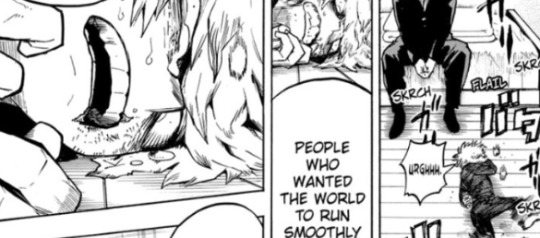
Which is why I find claims that Shigaraki is content with violence, or likes being a killer and is comfortable living this way to be false. Because Shigaraki’s own body constantly rejects him. He feels a compuslive need to scratch and harm himself because his body cannot handle the stress of being violent. It’s a stress response because Shigaraki does not actually on some level want to be doing these things, and living in a constant state of stress and harm makes him more compelled to vent his stress by following his compulsions.
The compulsion he feels can sometimes get so bad that in childhood he was rolling around the floor, crying and frantically scratching his whole body. This is not what All for One said and him holding back his urge to kill, but rather Shigaraki responding to the stress. Shigaraki is seven and was put in front of two homeless people who were threatening to harm him and he already came from a physically abusive household. He’s in unbelievable stress with no healthy way of venting it, and thereofre he compulsively self harms.
GAME TALK
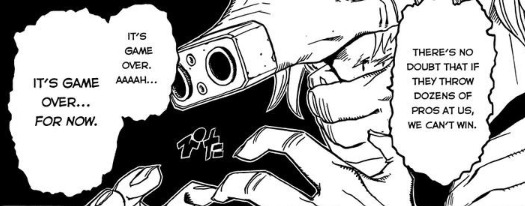
In general Shigaraki uses a lot of game talk. This is not so much a symptom of mental illness necessarily as it is a coping mechanism, but the goal is for Shigaraki to distance himself from reality. Basically it’s a mechanism for rgaining control because if you imagine life as just one big game where you are the player, you feel much more in control then some random kid who lost his family in a freak accident then got picked up by a super villain. Gamespeak is also a way of being deeply impersonal with the situation, in case it goes bad Shigaraki can say it’s just game over. It’s a layer of distance between him and reality, like I said, escapism to cope. His insistence of using game terminology for everything could also be seen as a “special interest” but once again that depends on your intepretation Shigaraki shows a whole cluster of symptoms that overlap with a lot of things.
HIGH ATTENTION TO DETAIL
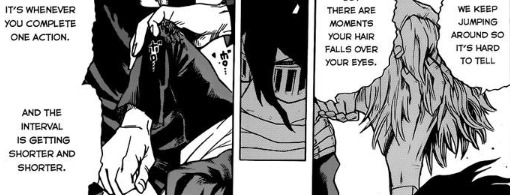
Shigaraki in a fight where he and AIzawa are jumping around trying to kill each other, Shigaraki is able to notice a detail as minute as when the hair falls over Aizawa’s eyes it stops, and also that his quirk was weakening because the tiny seconds long windows were getting shorter and shorter.
This is an extremely small detail to notice. Hyper-sensitizing, or hyper-attention to detail is another sign of mental illness, because usually the brain filters out superfluous details like this because otherwise noticing everything in that fine detail would overwhelm the senses.
Immaturity
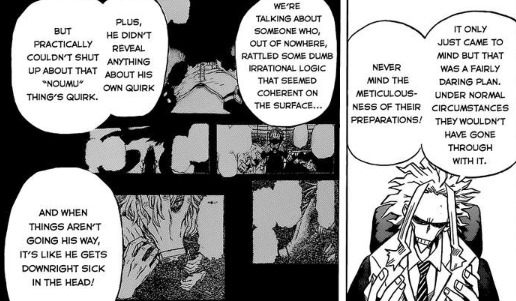

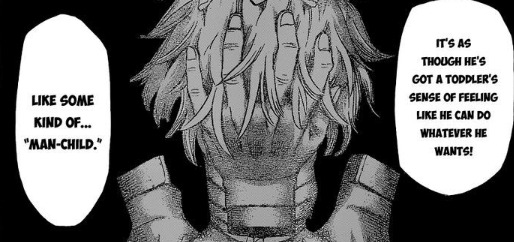
Shigaraki is completely unable to handle his negative emotions like a well-rounded adult. Though, I dislike how All Might and the others phrase it in this discussion because it is a pretty ablist description (downright sick in the head, a toddler’s sense of feeling like he can do whatever he wants). (the ablist part is that they’re using symptoms of his clear mental illness to dehumanize him.)
Regardless, Shigaraki of course does act like a man child, constantly talking about games, giving up easily, not having the patience to converse with others especially in situations he does not want to be in, throwing tantrums.
Children who are abused and neglected especially to the extreme extent that Shigaraki has, show long term developmental (that is term for the process of growing into a full adult) and behavioral problems. To the point where some studies have shown even the brain’s chemistry is permanently effected and the brain grows differently.
Children need a stable environment, and also positive role models for what adults act like to grow into full fledged adults, Shigaraki had neither of those. In fact he was also raised almost entirely outside of society except for the first five years of his life, so there is also no outside influence on his upbringing as well, which is why he is like a child, egocentric, unable to handle his emotions, because mentally he was never given the chance to develop past one.
ISOLATION

This is something that Shigaraki showed at the start of the series, but also has shown to develop past. At first he never left his room and from the several trash bags it’s quite obvious he spent long periods of time in there without taking care of himself or the environment around him in any significant way.
Shigaraki is no longer isolating as a result of having gotten closer to the league, he is basically available to them at all times and does not shut them off in any significant way. Which in this quick tangent we can also talk about symptoms Shigaraki does not have. Shigaraki is able to read a room pretty clearly, and knows how to hide himself in a crowd enough to keep Deku hostage with no trouble at all, and even leave the scene with Uraraka there without provoking her into attacking him or tipping her off what he was doing right away. Shigaraki is fairly competent at reading other people and he does have social skills so he’s not like someone who never sees the light of day or cannot interact with others and is clueless on how people think.
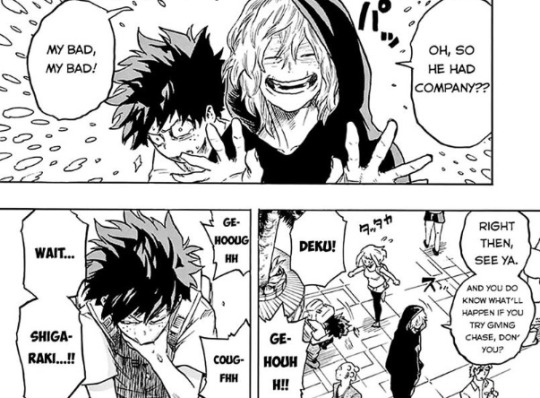
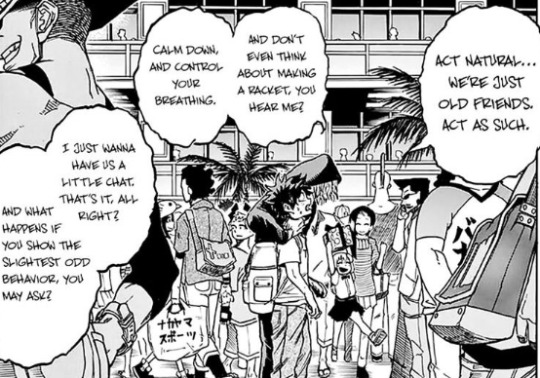
He’s also shown to be capable of making emotional connections with other people, and also of being considerate to those people’s needs. Which also shows that Shigaraki is capable of communication and also has an awareness of the feelings of other people and the ability to empathize, he is just choosy about who he makes connections with. He is definitely not someone unable to form an emotional connection with another person.
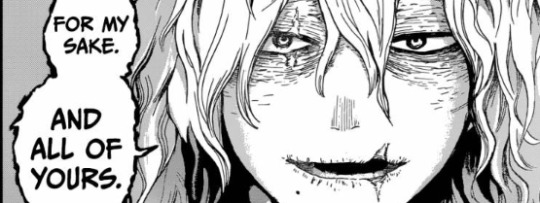
Shigaraki also shows a pretty flagrant disregard for all social norms, but that can be a result of being raised outside of society all of his life.
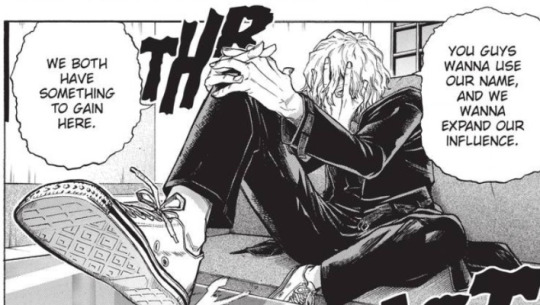
Shigaraki also likes to piss people off on purpose, almost like he is testing their boundaries and what he can get away with the same way a child playing around might.

Dissociation
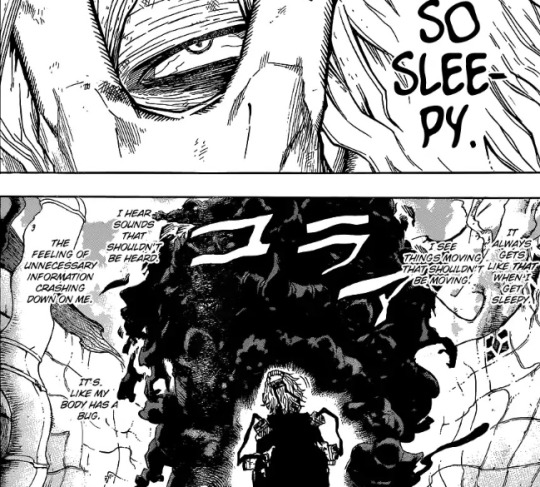
We have seen Shigaraki experience Dissociation in both senses of the word. First we have seen him physically detach himself from his feelings, and his own body in the middle of a fight and still continue on in a fugue-like state.
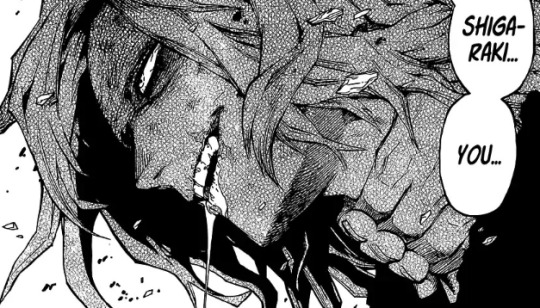
He experiences dissociation in the sense of the word meaning periods of detachment to your body, drifting away from your consciousness, severe feelings of alienation from himself, extreme difficulty concentrating or holding focus to the moment, his perception of both time and the area around him slipping to levels that are borderline hallucinogenic.
Dissociation is a mental process where a person disconnects from their thoughts, feelings, memories or sense of identity.
Shigaraki also displays traits of what is more classicly known as Dissasociative identity disord. He has two names, and clearly considers the life of Shimura Tenko to be separate from Shigaraki Tomura for a long time at the start of the manga. It might not be full on DID, but he at least dissociated his memories away from himself long enough that he forgot all of them like those memories belonged to another person, not Shigaraki but rather Tenko.
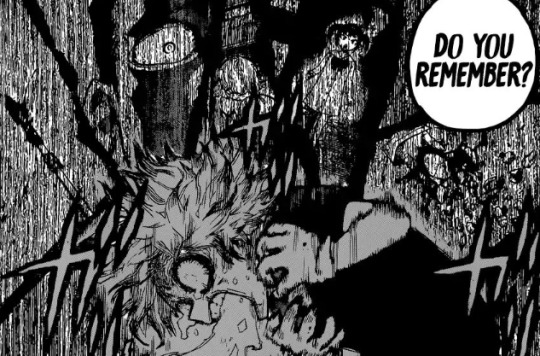

Shigaraki also foils Twice pretty heavily who developed actual dissociatve identity disord. He even shares similiar symptoms of speaking to himself when he speaks to the hand of “father”. I am not saying he has full on DID like I said I’m not diagnoising just that he displays several symptoms of it. He also came from an abusive household at an incredibly young age, which is where DID most commonly manifests.
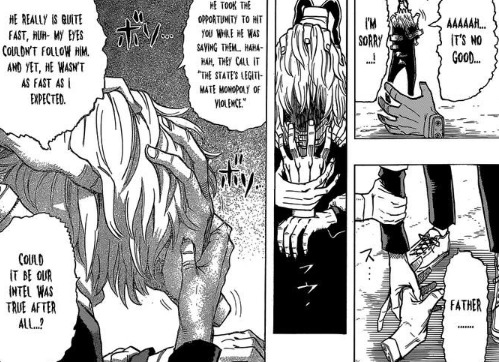
Shigaraki also shows signs of flashbacks when his memories return at inconvenient times during fights when direclty exposed to violence, or he experiences a trigger reminding him of his past. Flashbacks are a symptom that have the most in common with Post Traumatic Stress Disorder.
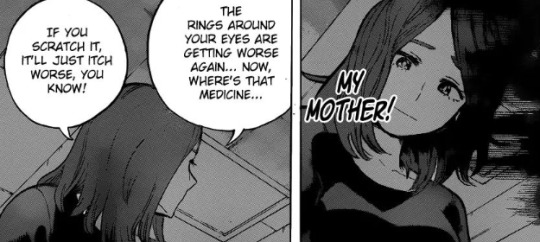
To answer your question on whether Shigaraki has a brain injury from when his father hit him with shears, there is evnidence suggesting he could have suffered brain damage, especially in the symptoms that he shares with Twice. However, at the same time Shigaraki also would have developed brain damage either way. Post Traumatic Stress Disorder is something that permanently rewires the brain after exposure to trauma. His brain has suffered a traumatic injury regardless of whether or not it was the garden sheers that did him in.
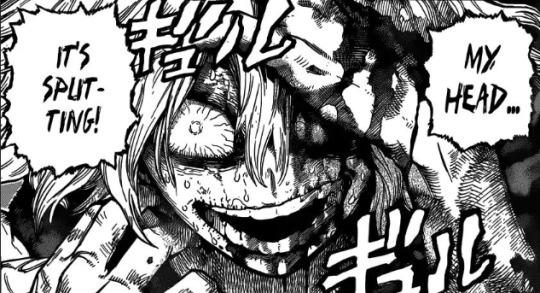
Suicidal Ideation / Self Harm

Shigaraki in general wishes to not exist, or to destroy everything so it will not exist anymore. Even if it’s not a direct wish for suicide that symptom is called suicidal ideation. It’s intrusive and persistent thoughts of suicide. The likely cause is once again, Shigaraki is absolutely not comfortable living like this, and is constantly overwhelmed with stress and pain and is seeking an escape.
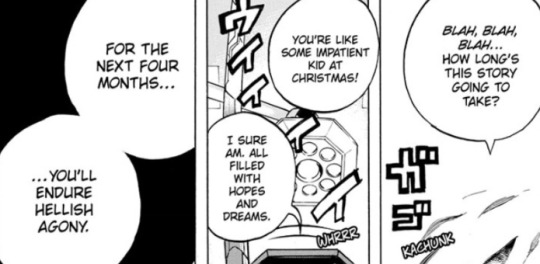
Shigaraki also actively seeks out harm. The same way he obsessively compulsively scratches, he puts himself into harmful situations like the extremely painful hellish surgery the doctor said he did not even have to endure if he did not want to. He feels compelled to harm himself, even when he is not fighting against someone else. He inflicts harm on himself becauseit is once again an unhealthy way to process his emotions. Oncce again all of these symptoms are there not to make Shigaraki out to be terrifying and incomprehensible because he is mentally ill, but rather to show he is a human being caught within the cycle of abuse with extremely unhealthy methods of coping with that fact.
#Anonymous#metasks#shigaraki tomura#mha meta#shigaraki meta#my hero academia#shimura tenko#tomura shigaraki
246 notes
·
View notes
Note
In Race to the edge, I do think that Heather is a good character in terms of being well developed and contributing to the storylines, but there are just certain aspects about her that stop me liking her. She just comes across as full of herself and really boar headed. I know that Hiccup is boar headed as well, but unlike him, Heather never listens to anyone. She talks down to the other characters as well, albeit not in a comical way like Snotlout and the twins do. With her it is more nasty.
I think it’s perfectly fine to recognize a character is a well-developed, good character, but at the same time not enjoy her presence on screen! In many cases, writing a good character means that the audience will hate them (Solf J. Kimblee and Shou Tucker from FMAB come to mind). Regardless, whatever the writer’s intent for characters, we all have the right to dislike or like the characters we do. Even if we fully understand why the character was written into a story, that doesn’t mean we have to connect and fawn over them. So you do you with Heather! That’s chill!
That said, I do think there’s an important distinction to make between Heather and Hiccup’s personalities and life choices. These two characters might both be boar-headed, but they come from very different life circumstances.

Heather is a character who lacks trust in others. She’s gone through many traumatic events, from being separated from her birth parents, to watching the Outcasts kidnap her adoptive parents, to watching invaders destroy her hometown and kill many people including her adoptive parents, to fending for herself with no humans to support her, to learning that the sociopath behind her misery is her biological brother. All these circumstances have scarred Heather to the point that trusting others is legitimately challenging - even daunting.
There gets to be a point in peoples’ lives that, when they’ve been repeatedly harmed by others… they lack the innate ability to form meaningful trusting relationships, even when they yearn to connect. There’s this constant internal dialogue taunting you, saying that you’re destined to be alone, that everyone will leave you because everyone always has. It becomes a game of fighting yourself and somehow reversing negative beliefs you’ve held for years.
Now, it’s not that Hiccup hasn’t had hard points in life too. I mean, he lost a freaking leg as a teenager! He had rough differences of opinion with his father, too. But he didn’t develop the trauma and vast insecurities Heather did. And while Hiccup’s had harrowing escapades with enemies like Alvin and Dagur, Hiccup’s emotionally improved throughout his teenaged years because his social network has increasingly supported him. Hiccup has become more confident, more comfortable, and happier. Hiccup has been able to trust his peers; he has a close-knit social network he knows he can count on, a father who believes in him, and a best friend dragon who stays by his side through anything.
Hiccup isn’t in a psychological situation where trust is hard to understand. He hasn’t been conditioned by negative experiences to the point that his internal dialogue is telling him his friends can never be reliable. Hiccup makes his boar-headed decisions for different reasons than Heather does. When Heather acts in her own interests, it’s not that she’s justified doing those things… she’s still making wrong choices that hurt others… but I think it’s understandable given her painful background. And frankly, that fear you’ll always be alone, that suspicion even the nicest people will have to leave you behind… it is HARD AS HELHEIM to unlearn.
We see this struggle in Heather throughout Race to the Edge. Heather doesn’t listen to the others because she’s scared to trust them. Heather acts on her own self-interests because she thinks that no one else will take care of her.
In Have Dragons, Will Travel, Heather says that she believes she’s destined to be alone. She’s gotten to such a low point that, even though she’s in the company of friendly people, she doesn’t think she belongs with them. She believes she’s been cast out alone, and that’s how life will continue.
Hiccup: I talked to Johann. He told me Dagur wiped out your village… and your family. I’m sorry.Heather: Then you know why he has to pay.Hiccup: I do. But you don’t have to do this alone.Heather: I don’t know. It seems that I’m destined to be alone.
Heather is unable to trust the dragon riding gang. She’s skittish. Even though she’s touched that they’re trying to do well for her, she’s also so accustomed to fighting for herself. Fearful that these people will turn against her, she can’t trust them with basic friendship instincts. She locks up their dragons, which is definitely for her own self-interest and their harm… and she’s doing it out of fear, from lack of trust.
Heather: Look, I’m sorry I locked up your dragons. I just didn’t trust that you guys would let me go after Dagur.
Heather’s fragile fears break when all the riders are tell Heather that attacking Dagur is a bad idea. Heather’s response that they’re “all talk” rather than friends. Now, it’s true that real friends stop others from doing foolish things. Fishlegs, Snotlout, and Astrid aren’t wrong to question Heather here. Heather’s reaction is emotional rather than logical. However, I find it very realistic given her situation. It’s a response I have seen MANY TIMES by people who’ve been scarred by trust:
Fishlegs: Wait a minute. You want us to go into battle with Dagur and the Beserkers without Hiccup and Toothless?Heather: Guys, I wish Hiccup and Toothless were here, trust me. But they’re not. And we can’t wait. Fishlegs: I have to say any aerial assault of this magnitude would be foolish without Toothless. He’s the most powerful dragon in our arsenal. Heather: You heard Johann, Astrid. This is our last chance. Tell them.Astrid: Well… Look, Heather…Heather: You too?! Just forget it. All that stuff about trust and having my back… I guess that was just talk!
Heather is so accustomed to being alone that when she sees her friends being less-than-rosy to her, her fears kick in, and she believes they’re full-out against her (because everyone’s always been against her, she feels).

Heather again demonstrates an inability to trust Hiccup in Snow Way Out. To be fair, she’s grown. She trusts Astrid enough to give Astrid information about the dragon hunters. At the same time, old habits and deep fears are hard to overcome. We see that Heather still is acting with limited trust, believing Hiccup wouldn’t react the right way to her spying, and that Astrid isn’t judging the situation right when she suggests they tell Hiccup.
Astrid: We should tell Hiccup what we’re doing, this doesn’t feel right.Heather: No. We agreed.Astrid: I’ve never lied to him before!Heather: I know. But this is the best way to take the Dragon Hunters down. From the inside.Astrid: Hiccup could help us! He’s really good at this stuff.Heather: He also cares too much. Astrid, if we told Hiccup that I was spying on the Hunters, we both know he’d try to pull me out of there.
To Heather or Not to Heather also shows Heather’s struggles continuing. Since she’s inclined to be alone, she’s quick to give up and believe she isn’t going to be part of the dragon riding gang. Windshear starts acting up, and Heather’s immediate response is that “this isn’t meant to be.”
Heather: Windshear doesn’t belong with other dragons. And no matter how much I love being on Dragon’s Edge, I’m not gonna choose all of you over her.Fishlegs: But you haven’t even given it a chance. Hiccup is the best dragon trainer there is. I’ve seen him do things I never thought were possible. Heather: I appreciate everything you’ve done for me. Really, I do. I just can’t take the risk.Fishlegs: Okay. I wasn’t gonna say this, but here it goes. I don’t want to go back to being long-distance Terror mail pals. I want you here.Heather: And I feel the same way. Believe me. But Windshear has spent her whole life with me. Protecting me, and watching over me. That’s all she knows how to do. I’m sorry, Fishlegs.Fishlegs: I have an idea. I’ll never ask you again, but please, just this once, trust me, Heather.
“Please, just this once, trust me, Heather.”
Even with the man Heather is starting to attach romantic affections with, she’s finding some difficulties trusting still.
I know I’m talking mostly about her in the first few seasons, but since this is the starting point of Heather (and her character arc conclusion is getting to the point she can even trust Dagur again in Gold Rush), I think this is the context whereby we can understand why she acts the way she does for the whole series.

It’s true that Heather is boar-headed at times, and it’s true that not all her boar-headed choices are based on lack of trust. It’s true sometimes she says things that are somewhat scathing to other dragon riders. But to be fair, the dialogue in the DreamWorks Dragons shows has Astrid and Hiccup saying some pretty scathing things to the twins and Snotlout, too. The friendship dynamic of the Edge is one of constantly haranguing on each other. In a weird way, the fact Heather starts dishing on the others has always felt to me like a depiction she’s finally part enough of the gang to understand their dynamics and get in on them. Doesn’t mean that all the insults the gang says to one another are justified, but it’s interesting to think that Heather starts picking up the crew’s interactions and becoming a part of them.
It’s also true that I don’t remember the middle seasons of rtte as well and am not talking about how she acts during those either!
So it’s not that Heather’s always justified in how she treats others or how she acts in her own interests. However, I think that we do have to understand Heather in this light of her psychology. Lots of the times Heather charges out on her own is because her life’s been conditioned that way, and she’s stuck in a psychological rut fearing that only she can help herself. She does also have a growth arc where she gets better about these things.
In the same way, when Hiccup acts boar-headed, stubborn, and aggressive in RTTE, it’s because of underlying insecurity. He feels uncomfortable being bested by Viggo. It starts to eat at him. Hiccup makes riskier, daring, and sometimes more stubbornly foolish choices… because of what he’s internally fighting through. It doesn’t take away the fact this is a character weakness for him. Faults are faults. But it does mean we can understand why he’s in this mental framework, too.
Whether or not we like Hiccup for acting that aggressive, or Heather for acting in her own self-defense, it’s up to us how we feel about them. And liking or hating them, even when we understand their dynamics, is a part of us being humans with opinions. No opinion of “I like this character” or “I dislike this character” is wrong! I suppose I personally don’t call Heather “nasty,” but “scarred and struggling.” She’s also a character I connect with and love in RTTE. That said, even if she didn’t have a background reason for being a little harsher in the story, it doesn’t change the fact that we can acknowledge characters who are good for storylines but might not be our personal faves. We all have different relationships with characters, and we don’t have to love all of them! For me, I’m happy to love Heather. For you, you might not connect, and there are other characters you enjoy seeing on screen!
Take care and stay awesome. Have a good one!
#happysafaricampers#long post#rtte#Race to the Edge#Heather#Hiccup#faq#analysis#my analysis#To Heather or Not to Heather#Have Dragons Will Travel#Have Dragons Will Travel Part 2#Snow Way Out#Gold Rush#ask#ask me
38 notes
·
View notes
Note
So how do you think Isa would act/react after being saved, if they had gone with the mind control angle instead? Because, by my understanding, it wasn't a "clean" takeover, like with Terranort, instead more of a gradual infection until there was nothing of Isa left in Saix, enough that he hadn't noticed it himself. I feel like after the fact there would have to be a lot of soul-searching to figure out where Isa had ended and Xehanort began.
That’s a very great and also very complex question. It’s going to require a pretty long response, since there really are SO many plot holes to fill in. But I feel like any explanation I give won’t make sense without knowing what exactly happened to Isa in the first place, and what the true nature of Saix is. And I can’t do these concepts justice unless I go into detail. You’re absolutely right that Saix is very different from Terranort. I have a theory as to why Saix is such a unique case and it has to do with his orange eyes.
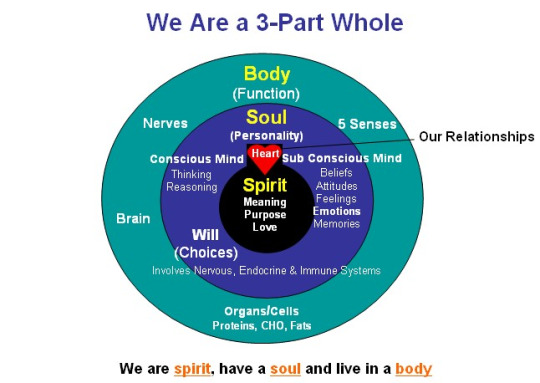
Three elements combine to create a life: a heart, a soul, and a body. But what of the soul and body left behind when the heart is lost? When the soul leaves the body, its vessel, life gives way to death, but what about when the heart leaves? A being does not perish when its heart leaves its body. The heart alone disappears into the darkness.
But first, in order to explain what I think happened to Isa, it’s important to get down to the basics. This chart is the most analogous I could find to the metaphysics of Kingdom Hearts. A complete person consists of three aspects that combine to make the true self. These aspects are Body, Soul, and Heart. When these three aspects are united, they connect the person to the Higher Self, henceforth referred to as Spirit.
Body: Pretty straightforward. These are the 5 senses. The biological “shell” we exist in to interact with the physical world.
Soul: “Soul” and “mind” are used interchangeably in KH. It’s basically our life force, as well as the “database” of accumulated lifetime experiences. Our memories, our thoughts, etc. All information is recorded here like on a hard drive.
Heart: The seat of our emotions that allow us to form interpersonal relationships. The Heart is absolutely vital because it acts as the bridge between the Spirit and the lower aspects of our being. If the Heart is compromised, it cuts someone off from their connection to their Spirit. If it breaks it also cuts them off from the Soul and Body.
Spirit: This term describes a person’s essence when they are connected with the Divine Source. This would be their true, fully conscious and aware, spiritual self. This is the complete self that is capable of making fully conscious decisions with love, meaning, and purpose.
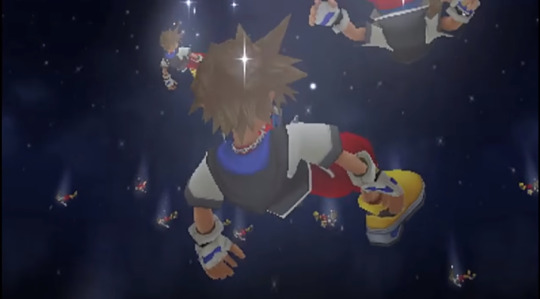
Kingdom Hearts mythology borrows heavily from ancient shamanism. There is a term called “soul fragmentation”. Minor fragmentation can disrupt soul energy and cause someone to not feel fully alive and engaged in life, develop chronic depression, addiction, etc. However the most severe form occurs when a living being is tormented into feeling extreme pain or suffering, especially when the trauma is repeated and they are never given the ability to heal. When the person reaches their breaking point and they cannot take the pain anymore, they will disassociate from their body and reality in order to get relief, and the soul will fracture into pieces. The ego that has been hurt or traumatized literally splits off and hides itself away. The most extreme type of soul fragmentation is where the soul leaves the body entirely and is caught between realities. Not dead, but pending in the astral realms.
It’s a natural and healthy survival mechanism that protects your soul from being annihilated, and shields the individual from the pain of severe trauma. But it also hinders the being from experiencing completeness. Since soul fragmentation is a natural coping mechanism, most of the time it is not severe and the fragments return on their own once things settle down. But this is not always the case. When the trauma has been particularly severe, repetitive and accompanied with extreme feelings of vulnerability and zero safety, the fragments do not return to the body. They refuse to return for fear of repeated trauma. Fragmentation may continue even after the consciousness has transitioned from the body.

Xehanort: Your body submits, your heart succumbs—so why does your mind resist?
Unfortunately, when the soul becomes fragmented it also makes possession by a low-vibrational spirit possible at the moment of dissociation. This is because nature abhors a vacuum, and will try to fill the void with something to be complete. When someone is not self-aware, they become susceptible to dark forces that can overpower their consent. A negative entity can keep the fractured pieces trapped in time, enabling full control of the possessed person.
This was what the Lingering Sentiment (also called the Lingering Will) was. A disembodied soul fragment of Terra that had taken up refuge in his suit of armor. The residual thoughts and sentiments that Terra had at the moment of his possession. Unable to move on, it remains trapped in that moment of trauma. It has a will of its own, but it’s not a truly conscious being in the way that complete humans are.Soul fragments are similar to a ghosts or poltergeists.
What it comes down to is this: if you can control the thoughts of the mind, you can control the soul, and you will then have control of the physical body. This is what Xehanort was attempting to accomplish with his mind control experiments. He wanted to fracture a person’s soul in order to make them a vessel. Fracturing the heart doesn’t work, because that results in the total breakdown of everything, including the body, which is the only thing Xehanort actually wants.
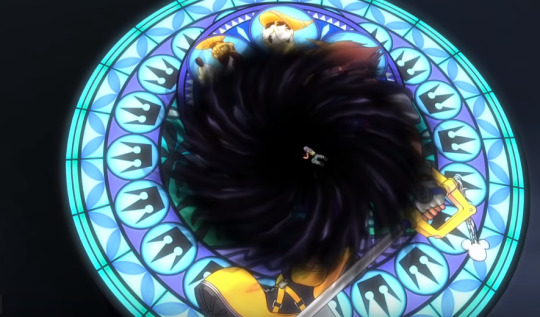
Mickey: You want him to dive back into Sora’s sleep? But Master, Sora’s heart is down in the darkest abyss. If Riku’s not careful, he might just get trapped down there with him. No… I’ll go instead.
The more fragmented the being, the more disconnected and less evolved the consciousness gradually becomes. If it is not healed and remains that way for long enough, it enters a danger zone; it continually sinks into the lowest dimensions of reality, where the personal shadow of the individual’s psyche and the collective unconscious start to flow together and merge.
Where this merge with the collective unconscious occurs, dark shadow beings start to emerge and multiply. In other words, the soul enters the the demonic realm, or the Underworld. This is no doubt what inspired the idea of the beach in the Realm of Darkness and even the Pureblood Heartless. The beach represents the meeting point between individual’s shadow self and the shadows of the collective unconscious; the darkness inherent in all people.
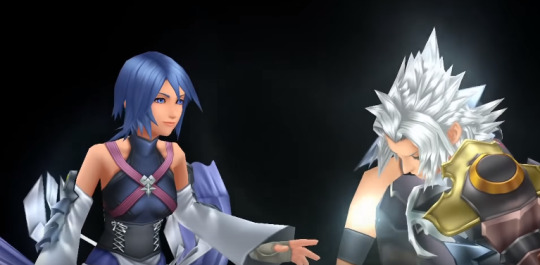
Yen Sid: The “Sleeping Keyholes,” are harder to reach. You’ll recall, in your first journey, that you brought many worlds back from the darkness–but some never returned completely. They still sleep, cut off from all outside channels. Not even the Heartless can enter.
If the soul is still not healed, it goes even deeper than the Underworld. In KH terms, that would be the Realm of Sleep. It becomes totally unaware of what is happening in the “surface” world as it escapes to a place of total darkness and safety with no conscious awareness whatsoever, just like going to sleep. In physical reality, it results in a sleepwalking, amnesiac or trance-like state of consciousness.
So if they stuck with the mind control plot, how would that affect Isa’s true consciousness? Basically, he would be in the same boat Sora would have been in if Riku didn’t dive into his heart to save him. Same with Terra if Aqua didn’t jump in after him. He’d sink down into the deepest, darkest abyss. Would Isa be conscious of what’s going on with his possessed self? Well, the spirit is only consciously aware of the contents of the soul when it is actually connected to the soul. When the spirit is disconnected from the soul, it becomes unconscious of the soul’s “database” of accumulated experiences. So, I would say no. He’d have no actual awareness of what his Nobody is doing.
But what about Saix then? What would that make him? And what about Isa’s heart? Well, basically I believe “Subject X” was nothing but a badly plagiarized version of Isa’s original backstory. So here’s what I’ll do: I’m going to use Nomura’s interviews and the Secret Reports to tell a story, and I’m going to edit the Reports from KH3 to more accurately reflect what I think was originally going to happen. This is my speculation on what the story would have been like if BBV2 never got cancelled.
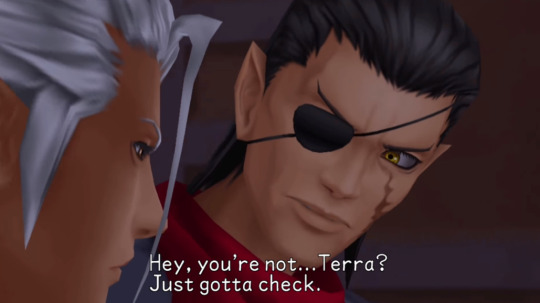
Nomura: Master Xehanort commandeered Terra’s body, and became Ansem the Wise’s apprentice. According to Secret Ansem Report 1 From KHII, the young man asked to become a test subject for Ansem’s research so he could get his memories back. After that they began the study of darkness, but did he really lose his memories? And are those memories Terra’s or Master Xehanort’s?
At what point were Ansem and Xemnas separated from Xehanort? When did they lose their memories?Nomura: Sometime between Birth by Sleep and Kingdom Hearts I. It happened during the events in the Ansem Reports from Kingdom Hearts I. Was it really memory loss? In the Birth by Sleep Secret Movie, Braig doubted it
When Terranort first becomes an apprentice, he seems really uncomfortable around Braig, suggesting that Terra is actually the one in control at first. Nomura also suggests as much. He probably does have amnesia, and it’s just his subconscious reacting to Braig. But Terra’s presence definitely seems to be the dominant one, at least at first. This is no doubt thanks to Aqua saving him from the abyss and Eraqus’ influence on his heart.
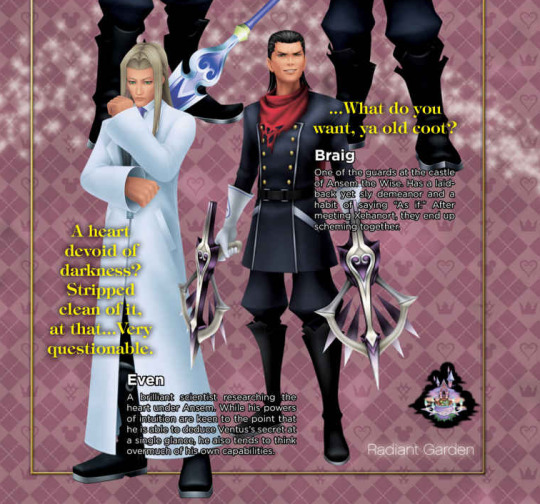
Secret Ansem’s Report 1
If I explore Xehanort’s heart by means of psychological tests, I may be able to awaken the past locked away within. My apprentice Even, too, has shown great interest in Xehanort’s memories. But is he really the right subject? Xehanort does indeed exhibit extraordinary talents…Too extraordinary…Perhaps they are even superhuman.
Even is very intuitive. He could sense that Ventus had no darkness in him at a glance. I think he could also sense darkness, and he took a special interest in Terranort because of this. I don’t think he trusted him. Anyway, Ansem conducts the initial experiment and successfully restores some of Terranort’s memory. Memories of Terra’s old life start coming back, but not fully. He’s desperate to know who he really is, so Ansem agrees to continue the experiments.
Secret Ansem’s Report 2
I have made a grave mistake. My study of the “darkness of the heart” began with a simple psychological test and quickly snowballed. Spurred on by my youngest apprentice, Ienzo, I constructed a massive laboratory in the basement of my castle. Unbeknownst to me, my six apprentices then began collecting a large number of subjects on which to perform dangerous experiments into the “darkness of the heart.”
From Ansem’s point of view, the experiments seemed to be having favorable results, and he even decides to build a huge laboratory in the castle’s basement. Ienzo spurred this on, but since Ienzo was just a child, he was no doubt told to suggest this idea to Ansem. Probably by Braig.
Ansem’s Report 7
I am studying material from the meteors that rained down that fateful night. What a find! The material is foreign to our world. It is elastic to the touch, and when two pieces are combined, they bond easily. None of the records even mention such a substance.
Was it introduced to this world when I opened the door? I wonder how many other such materials drift through the atmosphere of this tiny world… I wish I could soar off and find out! Could there be uncharted worlds up there? My curiosity never ceases to grow. But I should stop speaking of such unrealistic dreams. For now, there is no way to venture outside this world. My people and I are all but prisoners of this tiny place.
After repeated experiments, Ansem probes the depths of Terranort’s heart. But in addition to Terra’s memories, the experiments also restore his memories as Xehanort. Terranort remembers being a Keyblade wielder and his plan to create the X-blade. He regains his ability to use Master Xehanort’s Keyblade and opens Radiant Garden’s Keyhole.
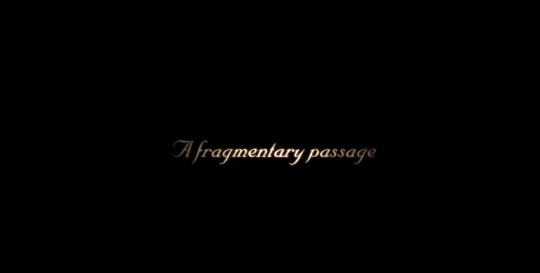
Nomura: While studying darkness the young Xehanort opened the door to the heart of Radiant Garden. This would have been possible if he had a Keyblade, but according to the Ansem Reports 4-8 in KH, he did not yet know about the Keyblade at the time.
Since Xehanort is possessing Terra, he also regains a lot of Terra’s fragmented memories along with his own, and they become intertwined. This creates a very mixed-up sense of identity, similar to someone with multiple personality disorder. They have “alters” that are totally compartmentalized, completely unaware of the other’s existence. Terranort constantly flip-flops between alters; sometimes, he can use the Keyblade, and other times he doesn’t even know it exists. The title for Birth By Sleep Volume 2 was supposed to be 0.5 A Fragmentary Passage. It seemed like it would totally revolve around this concept of soul fragmentation, and its style of story-telling would reflect that. It was supposed to be “bits and pieces of something whole” and tell the untold stories of many characters across the entire timeline. It’s probably why the producer went “…what?” when Nomura told him about the idea.
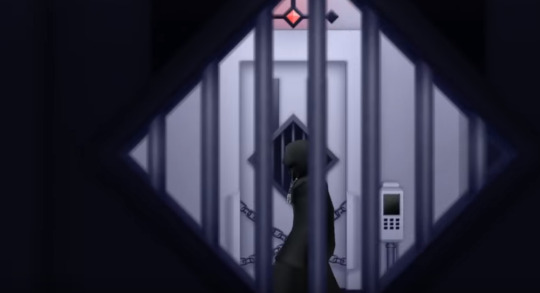
Although Terranort flip-flops between alters, Braig can see that the memory experiments worked, and the Xehanort alter remembers their original agreement. So, they decide now is the time to create vessels. Braig acts as Xehanort’s handler during the times he goes back to his Terra alter and they begin the experiments.
Ansem’s Report 2
It is my duty to expose what this darkness really is. I shall conduct the following experiments:
Extract the darkness from a person’s heart.
Cultivate darkness in a pure heart.
Both suppress and amplify the darkness within.
The experiments caused the test subject’s heart to collapse, including those of the most stalwart. How fragile our hearts are! My treatment produced no signs of recovery. I confined those who had completely lost their hearts beneath the castle.
But the experiments are not working. All the subjects experience the collapse of their hearts, making them useless as vessels.
Ansem’s Report 11
If the princesses and the Keyblade are connected, they should resonate.I’ve chosen a girl. I don’t know if she holds the princesses’ powers, but I will find out. She may lead me to the key bearer.
Sometime before Mickey’s visit from his flashback in KH2, Kairi is abducted by the apprentices and is experimented on.
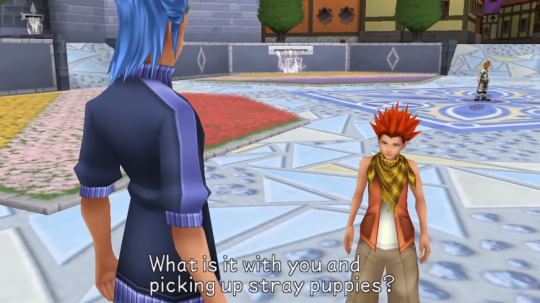
Memoirs
On the day we finally secured our entry, we descended the long spiral stair at the heart of the castle to find a dark space below it, lined with cages. There wasn’t light enough to see if they were inhabited, and we were in no position to call out to any occupants within. Yet we could feel it. A definite presence, there in the black. Terror washed over us, and we immediately regretted coming. But just as we turned to flee, we heard the faintest of voices. The urge to run was nigh overpowering, but someone or something beckoned us on. There, framed by a tenuous sliver of light, we found her. It was too dim to make out her features. We spoke to her in hushed whispers. Who was she? Why was she imprisoned here? She had no answers for us. Had no memories at all. She was an enigma, but I knew I wanted to help her. Lea was determined to free her, too. We slipped deeper into the castle that day knowing only that we wanted, with all our hearts, to save her.
Isa and Lea also come to the castle for their own personal reason. But at some point they become aware of Kairi’s situation and try to help her. I think the “stray puppy” scene was actually foreshadowing. I think Kairi was going to be another “stray puppy” that Lea would want to help.
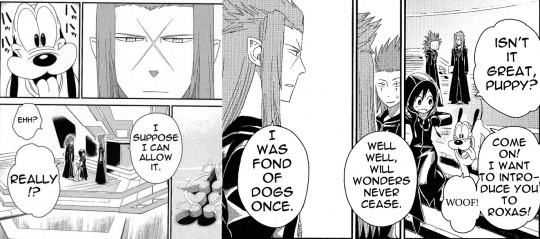
Since Isa is basically a male tsundere, he may scold Lea for it, but he likes puppies just as much as Lea does. Even the manga jokingly references Isa’s love of dogs. One of Isa’s weapons in 358/2 Days is named after a lunar goddess who is often depicted with a hunting dog as a companion and she was considered the patron and protector of young girl children. So given their personalities, they both attempt a rescue of Kairi. They are unsuccessful and the apprentices catch them.
Xemnas: “As your flesh bears the sigil, so your name shall be known as that…of a recusant.”
Isa, as a Moon personality archetype, has a large capacity for darkness. Even can sense this. So Braig and Terranort take a particular interest in him and dub him “Subject X” for being the most promising prospective vessel for the X-blade. He becomes Xehanort’s favorite lab rat. They do horrible things to him, including carving the Recusant’s Sigil onto his flesh.
Lea doesn’t go through anything nearly as horrific, because as a Sun personality archetype, his potential for darkness is not as great as Isa’s. Plus, there’s a better use for him. He is a good source of trauma for Isa. If the apprentices threaten to torture Lea instead, they can greatly increase Isa’s mental anguish and also get him to submit more easily. He’ll let himself get tortured to protect Lea. Isa’s Mystery Gear weapon (the one that’s supposed to bring out the wielder’s true personality) is actually a reference to a myth about a rabbit who is so selfless, he offers himself as food to a hungry beggar because he has no other food. So I think this is a fitting story line for his personality. Isa endures as much as he can possibly handle until he reaches his limit. He dissociates, his soul fragments…but his heart doesn’t break. Everyone realizes what a special subject he really is.
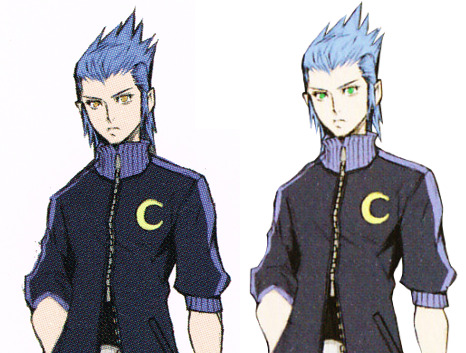
Isa is now an amnesiac in a trance-like state, leaving his body wide open for possession. Terranort successfully implants a piece of his heart into him. Isa gets Xehanort’d, and gets gold eyes and pointy ears. Weirdly, his BbS concept art shows a young Isa with gold eyes, along with his normal version with green eyes. Was there going to be a scene in BBS showing him get Xehanort’d? Was this reference art for BbS Volume 2? Who knows. But from here, I will refer to him as “Isanort”.
Secret Ansem’s Report 2
As soon as I found out, I called my apprentices together and ordered them not only to cease their studies, but to destroy the results of their research thus far. What on earth was happening within the hearts of my six beloved apprentices? While pursuing the mystery of the darkness of the heart, could they themselves have strayed into its depths? Yet I remain the most foolish of all, for having begun these experiments. We are not meant to interfere in the depths of another’s heart, no matter what our reasons for doing so…And my error plunged me into despair.
Experiments of the Heart – Notes on Subject X, Excerpt 2
Subject’s memories have not returned, and our conversations remain less than lucid. My pilot studies used a handful of subjects, but none possessed the fortitude to endure them. Ultimately, all suffered the collapse of their hearts. I knew it would be a heavy blow to lose a subject as unique as him. Upon discovering the tests I’ve been conducting, my master demanded that I cease my work immediately and destroy what research I have compiled. Worse still, he ordered the release of my remaining subjects. He is gone. Where is Subject X now? Has “wise” Master Ansem hidden him away? Whatever the case, I will not be deterred. I will get back the first successful subject of my grand experiment. —Xehanort
Anyway, Ansem the Wise discovers what Terranort and the other apprentices have been doing and he is horrified. He demands they destroy their research and release all the subjects immediately. He falls into despair for having begun these experiments in the first place and blames himself. Mickey arrives and consoles him. From the novels, we know that the apprentices kept Kairi sleeping in a pod even after Ansem ordered the release of the subjects; I would wager they kept Lea as well. He’s Subject X’s friend. But Ansem the Wise does get a hold of Isanort and takes him away. Terranort wants him back, though.
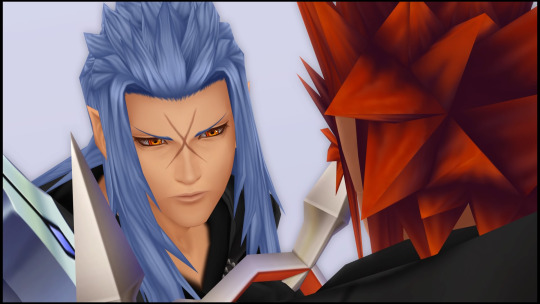
Experiments of the Heart – Notes on Subject X, Excerpt 1
Subject was found in the castle basement shortly after dawn. Male, approximately fifteen years old. After seven days’ observation, he spoke his first words, but could not provide a name. Subject exhibits signs of profound amnesia and displays concern for where his friend is. His words suggest that he arrived with another, though he cannot recall the name of his erstwhile companion. All efforts to explore those memories have met with a rejection response.
After my initial experiments on my apprentice, I ceased my research into the heart, my hand stayed by some profound fear I could not fathom. My fears proved to be well-founded. And now this subject is just like my apprentice was when I first discovered him: devoid of memories. The fault is mine for having begun this research. And yet this subject is someone who could actually benefit from my original work. My apprentice, Xehanort, had begun to reclaim his lost past thanks to these very experiments: by traversing the heart, we have a direct path into memory. If my research can help him regain his memory, perhaps I can atone for the mistakes I have made. Who is he? This is a question I cannot ignore. I must ascertain his identity.—Ansem
It’s funny to me because I honestly don’t even have to change the Reports that much to make them fit Isa’s situation perfectly. It’s really too easy. Like, they’re just too good of a fit to be a coincidence. Anyway, Ansem takes Isanort away and tries to figure out who he is. Because Lea is gone, no one can identify him and Ansem has no idea what to do with a mysterious teenager with profound amnesia. He feels it is his duty to help him regain his memories, and reluctantly performs experiments on his heart.
Recollections
Am I alive? I awoke in a cell, alone until the researcher came and asked me countless questions to uncover my identity. I had no answer to offer him. A friend…that is the sum total of my memory. I could not even recall my name. I was simply called “X” there. I found no solace during the time I spent in that dark and lonely cell. One day, a man came to take me from the prison. I could not see him for the darkness, save that he wore an eyepatch. Even now, I feel no closer to understanding who I am. —Unknown
This is how Isanort would be after Ansem takes him into his custody and he helps him become coherent enough to talk. He has Xehanort’s heart fragment in him, and his soul was fractured, so his memory is a total mess. A person’s heart getting swallowed by Xehanort’s is a gradual process, so he’s still not fully Xehanort yet. His heart still remembers certain things. He remembers a friend, that he was called “X”, and that a man with an eyepatch took him from the prison cell to somewhere else (probably when he was going to be tortured). And his memory cuts off there. It’s too traumatic; these memories stay blocked out and relegated to his subconscious.
“The mind forgets, but the heart will always remember. And what is the heart’s memory but love itself?” ― Twan Eng Tan, The Gift of Rain
During the experiments, Ansem connects with the depths of Isanort’s heart, bringing back his lost past. Since Terra and Isa were both fragmented previously, a piece of Ansem gets left behind inside of their hearts, affecting their eye color. This is how Saix gets orange eyes, not the gold ones the other vessels have. Since the heart is the bridge, Ansem can restore the “databank” of information, even though the real Isa is still lost in the Realm of Sleep. Even when Isa’s heart gets completely consumed, the soul data will remain. So this alter ego of Xehanort will now gain access to the collective sum of Isa’s memories, thoughts, experiences and emotions. He will believe he is Isa—the real Isa. He has no other memories to give him any other identity. But of course, he’s really not.
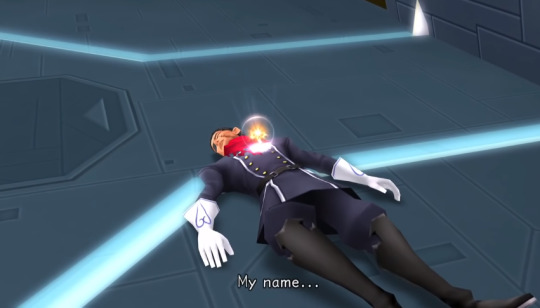
Sometime later, Isanort is stolen back from Ansem the Wise, who gets banished to the Realm of Darkness. But then something goes wrong. Terranort is struggling badly with his split personality, as well as Ansem the Wise’s influence on his heart. He starts thinking he’s actually Ansem and he turns on everyone, steals their hearts, then becomes a Heartless himself. He becomes Ansem Seeker of Darkness, who also has orange eyes. Everyone becomes a Nobody at this point. Saix is created as the Nobody of Isanort, similar to Xemnas being the Nobody of Terranort. He’s STILL another self of Xehanort. But thanks to Ansem the Wise’s experiment, Saix retains all of Isa’s memories. So he doesn’t seem any different from the other Nobodies who never lost their memory.
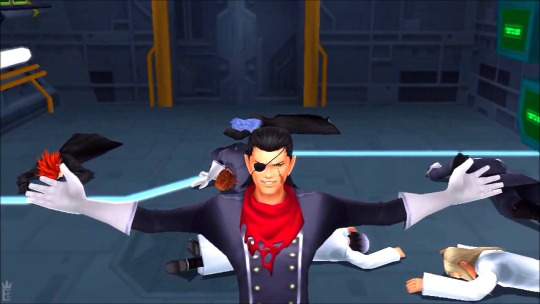
Lea has no reason to think his friend’s situation is any different from his. They were both wearing black cloaks then they became Nobodies. They were both experimented on and are both victims, though Axel wasn’t hurt as badly. He’s still mostly the same person afterwards. Nobodies lose their heart, but what makes them unique is that their soul and body remain due to their strong will. He has no clue what really happened to his friend, though. And despite being another Xehanort, Saix actually thinks he’s Isa and he genuinely wants to overthrow Xemnas with Lea. They make these plans together and work cooperatively. Saix doesn’t trust Xemnas and wants to figure out his secrets. And Lea feels the same, plus he wants to support his friend. Xemnas really likes Saix for some reason, so they work together to get Saix to the top of the hierarchy.
Nomura: It is a fact that Saix and Axel probably wanted to take over the Organization, however they didn’t understand what they were going to do or how to do it. As for Xemnas, he knew about this betrayal, but never brought it up. Generally, one’s conduct was for the sake of their purpose.
Xemnas knows ALL about their plans to overthrow the Organization, but he doesn’t try to get rid of them like he did with Marluxia or Larxene. Why? Nomura says that they were serving their purpose. With Lea, it’s probably because he’s very useful. He follows orders, eliminates traitors and since Xemnas knows where his loyalty stands, he can predict his behavior.
Xemnas: But weakness has the power to awaken that which is dormant. It is clear that through his actions, however foolish they may have been, Axel has touched Sora’s heart. Perhaps HE will soon awaken.
Axel was very useful to Xemnas in 358/2 Days. Riku wound up in Castle Oblivion because he “resonated” with Sora. And Axel grew closer and closer to Roxas during Days. I think that’s why they kept sending him back to Castle Oblivion. Xemnas thought that Axel might “resonate” with Ventus, allowing him to find the Chamber of Waking. It didn’t work, though, because Ventus’ heart was said to be inside of Roxas.
I just did what I thought was the best thing at the time. For Roxas, for Xion, for the Organization—and for Isa. But most of all for me.
This is from the novel. It’s Axel’s inner monologue after Roxas gets angry at him for attacking Xion. He’s STILL loyal to his friend, even though his friend is no longer even there anymore. I think this is why Axel was never considered a traitor. He’s technically still loyal to Xehanort, even if he doesn’t realize it.

Xemnas: The poor fool. How long will he keep chasing the illusion of friendship, when he himself lacks emotion? Trying so hard to retrieve what he has lost, when it may never have existed in the first place. He deserves nothing more than our pity.
I think Xemnas’ quote in KH2FM+ was even more about Axel’s relationship with Saix than it was about his relationship with Roxas. Xemnas’ face was shrouded as he just stared at Saix. It seemed like the same visual cue they used when Xigbar was asking about the Chamber of Repose and the Chamber of Waking. It felt like a hint that there’s more to be revealed on this subject that is still shrouded in mystery. Axel’s friendship with Saix never existed in the first place. It was all an illusion. Xemnas knew. It really shows how he was able to use Axel’s desire for friendship to manipulate him.
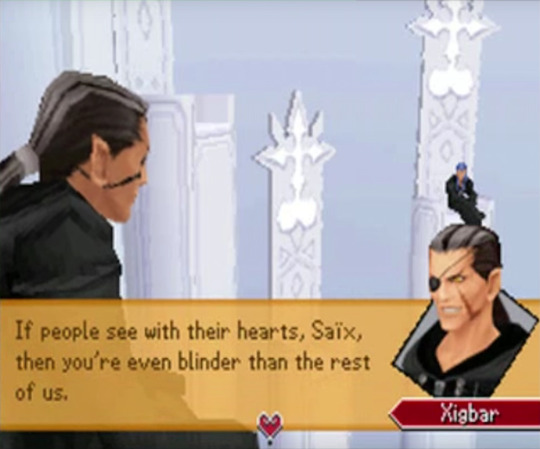
Poppet…? Apparently he meant Xion. But what resemblance was he referring to? Xion was just as much a puppet as ever. Saix had no time for these deliberately oblique remarks from Xigbar.
“Nonsense. I see no problem whatsoever.”
Xigbar only laughed louder. “Pa-ha-ha!” No, apparently you don’t!”
“Something you find amusing?”
“Oh the things you hear from a guy with no heart,” Xigbar said through his hilarity.
As for Saix, Xemnas was probably just amused because he is not actually a threat to him. They’re the same person, even if Saix is none the wiser. This conversation is from the novel, but it also happens in the game, as well as the movie. Saix clearly has no idea he has been Xehanort’d. Braig does know, and he finds it hilarious.
“Don’t let us down now, kiddo. Shouldn’t be too much trouble without a heart,” Xigbar told Saix.
Then there’s this scene later on, also from the novel. It’s when Xemnas decides to eliminate either Roxas or Xion, and orders the memory devices to be placed. Xigbar calls Saix “kiddo”. I think Braig played a huge role in the human experiments and Isa’s condition. Seeing Saix act so clueless made him remember experimenting on teenage Isa and he nostalgically calls him “kiddo”.
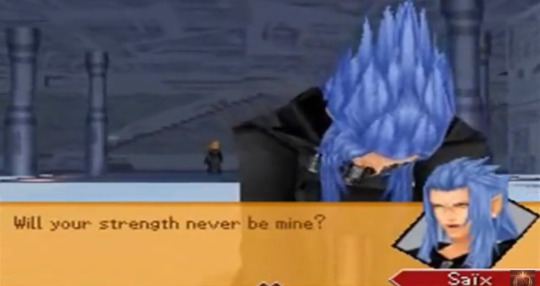
“I’ll bring him back to our side. Let me—”
“That’s enough.” Saix turned his head, giving Axel a sidelong look over his shoulder. “Traitor.”
Axel scowled darkly.
“I’m going. You know, don’t you, that you won’t stop me except by force? And even if you tried, you would fail.” Saix went on his way. Memories informed him that he hated this kind of thing.
There are other scenes from the novels that are phrased in a manner that made me feel Saix is simply Xehanort who has Isa’s memories. Right after Roxas leaves the Organization, it talks about how his “memories informed him” that having conflict with Axel and fighting was something he hated. It’s just phrased in a way that makes his memories sound so…foreign to him. Like they’re so at odds with his current personality that even he doesn’t understand them.
Saix blocked the sweep of the Keyblade. It brought back those long-ago days when there had been some pleasure in fighting. The Claymore slammed into Roxas…And he recalled things from long, long ago.
This is while he fights Roxas. What exactly is he remembering? It sounds like he’s remembering Isa’s past. What pleasure did Isa get while fighting? That’s definitely not something we ever got to learn in KH3.

So why can’t Saix just regrow a heart like everyone else? Nature dislikes a void and seeks to fill it as soon as possible. Well, I think Saix does have a Heart…sort of. He shares a heart with Xemnas and Xehanort. The jokes Xigbar makes about him having no heart are a reference to Isa’s heart.
This is a scene from the KH2 novel that isn’t in the game. It happens after Kairi is kidnapped by Axel, and Saix faces off with Riku in Twilight Town. Namine is with him.
“You have no part in this!” Saix slapped her across the face, hard enough to throw her to the ground.
“I feel bad for you, too,” she told him.
“What are you talking about?” Saix towered over Namine.
“You haven’t even noticed yet…that you have a heart.”
Several Nobodies emerged from a rift out of the corridors.
“A heart? I have a heart? No one wants your nonsense!”
Saix raised his sword over Namine—but Riku was there with Soul Eater to intercept the blow.
“Hmph. I don’t have time for these games.” Darkness welled up from a rift behind Saix. “Run along and help your dear hero.”
With that, he disappeared.
“Are you all right?” Riku helped Namine to her feet.
“Now I understand…,” she murmured.
“Namine…? You understand what?”
She was silent for a moment and quietly shook her head as she stood. “It’s nothing. We have to find Kairi.”
Namine realized something important about Saix, but she had no time tell Riku about it. I think she realized at that moment that Saix’s true heart is actually captured by Xehanort. So, where exactly is Isa’s heart, then?
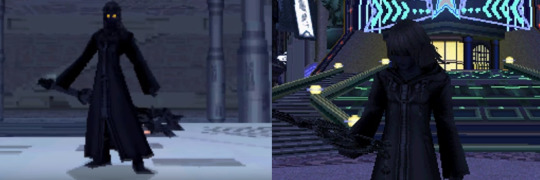
And he had some kind of power—something that gave her that weird feeling when she fought him. Like a Saix aura. Who was he?
That’s what Xion says in the novel after she fights Riku. She says he gives off a “Saix aura”. Interesting choice of words. We know that Riku has Xehanort’s Heartless living inside of him, which is the cause of his dark aura. Why does Saix give off the same aura unless he’s different from the rest of the Organization in some way? In Days, there are a couple of optional boss fights that really stand out. Anti-Riku and Anti-Saix. The only Anti-form boss fights in the game.
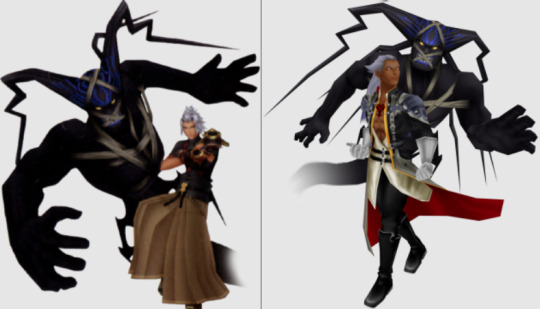
In “KHI” when Sora stabs the “Keyblade of people’s hearts” into himself to release his heart and Kairi’s, Sora’s Heartless and Nobody were born. When Master Xehanort and Terra:Xehanort stab themselves with the Keyblade, were his and Terra’s Nobodies not created?
Nomura: That is not yet clear. However I will say that the fixed sentiment that remained just after Master Xehanort stabbed himself with the Keyblade was not a Heartless.
If Isa’s heart has been swallowed by Xehanort’s heart, then he should be in a similar state to Terra, who became Xehanort’s Guardian. It mostly does his bidding, but it is capable of recognizing certain people that it had a strong emotional connection to. It clearly remembered Riku in DDD, and he recognized it as well. And it refuses to attack Aqua and Ven in KH3. Nomura said that it is not a Heartless.
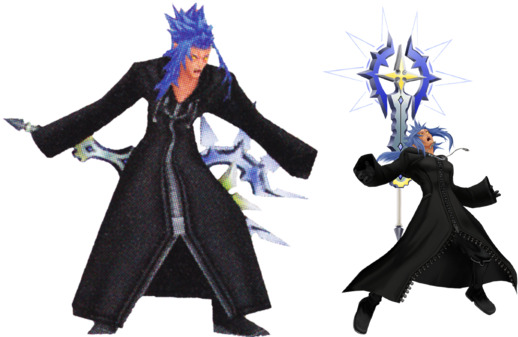
What happens to the hearts of those who have had Master Xehanort’s heart planted within them?Nomura: They’ll gradually be swallowed by it. As for Master Xehanort, he plans to control them completely. The planted parts of the heart are captured rather than disappear.
It’s Terra’s captured heart that’s being controlled by Xehanort. That’s what I think Saix’s Berserk state is. That’s what I think happened to Isa’s heart. The Berserk state is his repressed shadow self.
Second in command who longs for the heart he does not have. Only the moon breaks his icy calm.
Soul fragmentation plays a huge role in creating the shadow self. This is a part of the subconscious that is composed of repressed feelings, instincts, impulses, weaknesses, desires, and fears. The heart remembers even when the mind forgets. The Berserk state contains all of his rage and pain from the repressed memories of being experimented on and tortured. So it goes insane during the full moon, which brings the repressed memories of the subconscious to the surface. Because of this pure rage, it’s a very effective weapon.
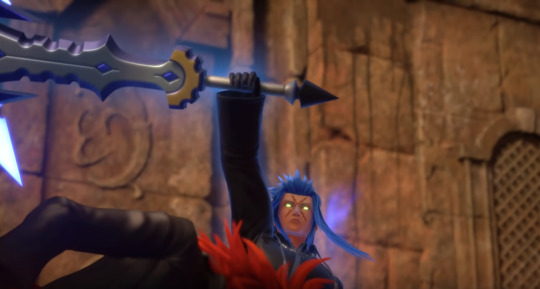
Saïx: Do you know what happens to those who lose their true purpose? Inevitably, they destroy themselves.
The Berserk form is used when Saix fights Lea at the Keyblade Graveyard. I noticed during the final battle that Lea doesn’t try too hard to fight Saix. He pleads with Isa to stop attacking and looks directly into his eyes. Berserk Saix raises his Claymore, but he stops and doesn’t attack Lea. Then Xemnas shows up. Of course, canon!Saix was fully in control of himself and was just pretending to be loyal to Xemnas (which makes no sense).
I think originally, that scene would have showed that Isa’s heart still remembered Lea even when his mind didn’t, and he didn’t want to hurt his best friend. Just like The Guardian wouldn’t attack Aqua and Ven. He promised his friends that he would set things right. Terra remembered his true purpose. Same with Saix. His heart would finally remember that friend whose name he couldn’t remember. So Xemnas has to step in and take over the fight.
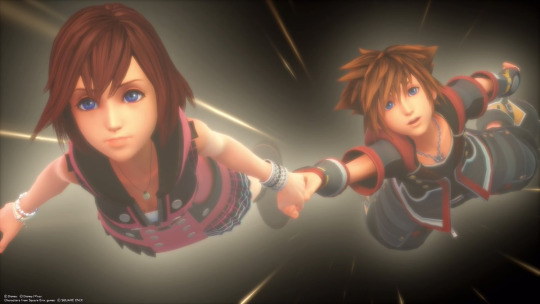
Young Xehanort: It’s for traversing hearts to reach worlds. Not for traversing worlds to reach hearts.
Lastly, there’s the issue of how to heal Isa and what his personality would be like after getting saved. There is a concept called “soul retrieval”. Soul retrieval is an ancient practice that shamans use in order to bring an individual who is suffering from soul fragmentation back to wholeness. The shamanic approach to healing this condition is to enter an altered state of consciousness and journey into the inner spirit world, retrieve the lost parts of the soul, and reintegrate them into the psyche of the afflicted person. This is where the whole concept of “birth by sleep” and “the power of waking” comes from.
The soul cannot return, in whole or part, if there is anything occupying that space. So it is not just about calling the soul back in, but also removing from the energy field all that is blocking the return of the soul parts. The inner spirit realms are often inaccessible and are guarded by heavy defenses that make it difficult or impossible for the fragmented person to go through on their own, without the guidance of a shaman.
Generally, it is not recommended for anyone other than experienced shamans to attempt a soul retrieval. It can be very dangerous even to experienced shamans. Only one who has gone through a shamanic death initiation can go to these realms without risking injury or even physical death. There are some scary parts of someone’s subconscious and the astral realm in general; parts that could be threatening, angry, violent, self-destructive, primal, and so forth. It’s probably why it’s considered something that only a Keyblade Master can do.
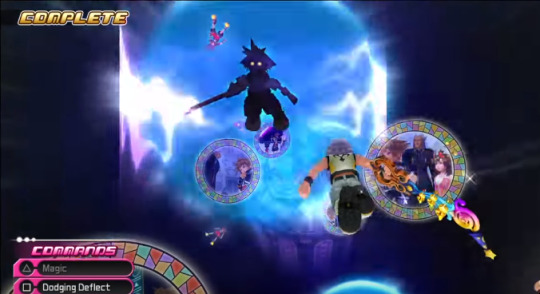
Mickey: There’s something real strong that binds us to each other. Even in the darkness, you can reach him. All you gotta do is follow that connection!
Soul fragments generally hold a lot of psychic pain and trauma. Realigning them is not an easy endeavor and requires assistance from those who are balanced and connected with the higher realms of light. Fragmented soul pieces may appear as shadow selves as well. When Riku dives into Sora’s heart, he sees anti-Soras as well as normal Soras.
In these soul retrieval journeys, harsh energies manifest in the form of archetypal images of monsters, demons and other dangerous beasts. These are the guardians of the soul, or in psychology they are known as defense mechanisms of the psyche. The shaman must overcome these in order to persuade the soul fragments to come back.
Once the lost fragments are located, the shaman communicates with them, in order to ascertain how or why it left. They will acknowledge the former pain and gently negotiate the soul’s return to the body. Each part is gathered and brought back through the “veil” between the worlds and gently reconnected into the person, by blowing into their heart.

The soul cannot be forced back, though. It has to want to come back. The shaman can only persuade it. The soul pieces must process the original trauma that caused the splitting and find a way to overcome it. I think this is why the theme song for KH3 is “Face My Fears”. It’s all about confronting the darkness within and emerging stronger and more whole than ever before.
Soul retrieval brings back one’s consciousness, personal essence, life force and vitality. It is a major action that changes a person’s life. A soul retrieval is one of the most powerful forms of healing a person can experience. Upon the return of lost soul parts, people feel a sense of well being and wholeness, childlike joy, exuberance and vitality. They experience a dramatic shift in consciousness, a sense of personal power, and a new level of spirit to heart connection. Not only do I think Isa would be the same person he was before he fragmented and not influenced by Xehanort…I think he’d be more spiritually healthy than ever.
But someone would need to perform this soul retrieval on Isa. You need to be able to ease the person’s pain to convince them to come back to reality. For such severe fracturing, a deep heart connection with the person is mandatory. Anyone else would just wind up hurting him and fragmenting him even further. This is another danger of soul retrieval. The only one who could do it for Isa is Lea. But he’s not a Keyblade Master.

Nomura: Ansem’s research results will become the key to healing the “pain” in the future of the story.
Nomura: The data that Ansem has hidden within Sora is the secret to that revival. When Ansem had become DiZ, and studied the heart and emotions, the results he found he hid within Sora.
Nomura: You could say it’s the key. That data contains the details explaining the way to connect lost hearts.
Nomura: There are two possible meanings of the “key.” One of which is the ‘hardware’ key, which opens doors - this is what keys are in general, and the other is the ‘light’ key, that opens something else. In this case, it is currently unknown as to which type of key Sora must find. This is the main storyline of Kingdom Hearts III - Sora must go on an adventure to find the “key” without knowing what or where it is.
Although the ancients discouraged untrained people from performing soul retrieval, technically anyone can do it. Truly empathetic and unconditionally loving humans gain the spiritual power to recollect the consciousness fragments of traumatized people that are trapped in the astral realms. When someone practices unconditional love, it helps to integrate and heal the fragments, as well as neutralize any negative emotional energy in the environment. THIS is what I think Ansem’s research was originally all about. The “power of waking” exists in us all. Sora is looking for a key that is inside of him the whole time.
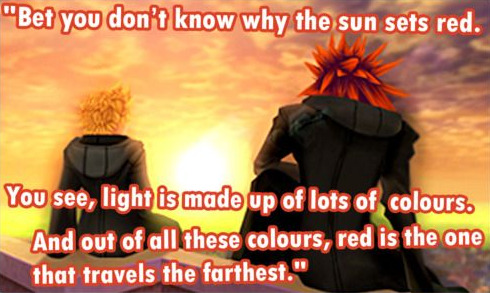
Go on, you just keep running. But I’ll always be there to bring you back!“
The Realm of Sleep exists in the deepest, darkest abyss. Only the farthest-reaching light could possibly penetrate darkness that deep.
#long ass post#kingdom hearts#kingdom hearts meta#kingdom hearts 3 meta#kh3 spoilers#anti-kh3#kh saix#kh isa#kh axel#kh lea
45 notes
·
View notes
Link
Eric Zawadzki here, co-developer of the new Deviant: The Renegades line. Dave Brookshaw and I are hard at work redlining, but I thought I’d take a moment to share an excerpt from this project. Today we’re going to share Origins with you, which is one axis along which Deviants are organized, the other being Clades.
The usual caveats apply: This is still an early draft, so things could and likely will change in some places. Enjoy!
Origins
A Deviant’s Origin is not just a matter of circumstance, but disposition. Some of the Remade readied themselves for transformation, or at least believed it was a worthwhile price to pay. Others were taken against their will, had Divergence forced upon them by a family legacy, or were transformed by accident. While Clade describes the Remade based on the Variations she manifests, the Origin’s effects are influenced by deep-seated attitudes and the way the Deviant’s initiation into their kind supports or offended their physical and spiritual autonomy.
Conspiracies have long studied the nature of Deviant Origins. Some scientists wish to eliminate Origin as an influence on Divergence, to control the manifestation of Variations and Scars precisely. Conspirators wish to instill loyalty, and remain confounded by Origins which seem to promote defiance, or twist careful conditioning into resentment. Not all Conspiracies are so focused on control, however, and believe a subject’s ability to influence their own transformation presents opportunities for further research. Could a carefully conditioned zealot manifest stronger Variations? What about a pretended accident, or torturing a subject so that, in defiance, they develop novel abilities? Established Conspiracies may attempt to manipulate Origins in this way, and the latest generation of Deviants may share stories of the strange, excruciating psychological experiments that followed.
Conspiracy literature identifies five major Origins, with formal and informal designations. They are:
Autourgics: The Elect wholeheartedly wish to be Remade, to satisfy a sincere personal desire or some ideologically driven urge. They may not know what they will become, exactly, but understand they will break the confines of human nature and welcome it. They tend to manifest overt Variations, and often remain deeply entangled in the Conspiracy that makes them. In fact, many are senior Conspirators themselves, and in a few cases, are their own Progenitors. Most of the Elect are Devoted — they get what they wanted, even if it comes with a certain degree of trauma. Renegades are usually those who chafe against Conspiracy control, or who discover that post-humanity isn’t what they believed it would be. Autourgic Deviants are some of the rarest, least-trusted Renegades, since their very existence indicates that at one point, they believed the Conspiracy was right.
Epimorphs: With threats and promises, Conspiracies convince Volunteers to become Remade. Where the Elect seek transformation for its own sake, Epimorphs agree to it to pursue some secondary goal: money, freedom, or safety for loved ones. Many Volunteers are lied to about what will happen to them or are desperate enough not to care about the details of a drug study or a mandatory journey to some weird, remote locale. Epimorphs are often Devoted, though not always sincerely so, hunting Renegades for pay and perks. For them, Divergence involves developing deep ties to the Conspiracy, and even if they go Renegade, they must deal with the connections they establish from fellow workers, caregivers and other connections. Volunteers tend to display covert Variations.
Exomorphs: Remade intentionally, but against their will, the Unwilling usually turn Renegade whenever a safe opportunity presents itself. Conspiracies treat Exomorphs with utter contempt or the grim pity one feels for an enemy who never wanted to be where they are, but who must be put down, nonetheless. Unwilling may be kidnapped, threatened, incapacitated, or even secretly exposed to the means of transformation. At some point, each of them is made aware of the developing Divergence but is unable to escape it. Exomorphs manifest overt Variations. This may be due to the Conspiracy’s callousness promoting bolder action, or it may be that Unwilling antipathy leaves Scars. In many ways the archetypal Renegades, they tend to be especially driven to destroy Conspiracies, and prevent anyone else from suffering as they did.
Genotypal: Deviants who owe their Divergence to their parents, the circumstances of birth or conception, or some legacy buried within their ancestries. Some of the Born always know they are special, and are either the children of Remade, or possess some recessive trait or lineal quality that designate them as “the One Who Will Arise,” or some other ominous figure prophesized by science or tradition. In other cases, such origins are kept hidden by parents, or even arrive out of the blue, the result of a long-dead Progenitor’s experiments on an ancestor. Genotypal Remade often discover their Variations in adolescence, though this isn’t always the case, as a critical trigger might come earlier or later. These circumstances lead to many types of Variations, and a wide variety of attitudes about the Conspiracy, where some might be “nobility,” and others may have been taken away by caregivers, given new names, and hidden away.
Pathological: Deviants that are victims of pure circumstance. These Accidents open a strange machine, fall into a pool of otherworldly energy, or happened to have a rare genetic or spiritual condition which ensured that a disease that killed everyone else Remade them, instead. Pathologicals have no clear Progenitors, and no necessary links to a Conspiracy. In fact, the Conspiracy might form because of a Pathological’s accident, as the curious and ambitious organize to pursue their interests.
Epimorphs: The Volunteers
I never knew what I wanted until I tried to get it.
Down on your luck. Bored, Desperate. Willing, though not entirely wanting. Conspiracies call people like you “Epimorphs,” because even though you don’t have an urge to be Remade, your neediness provides fertile soil for whatever they want to grow — or graft, or inject. The method matters less than the psychic factor you present, which might also be imagined as a certain hollowness. That emptiness drove you to accept Divergence, to ask few questions than you should have, and subordinate yourself to the Conspiracy’s needs.
Whether you think about this potential as emptiness or new, raw earth, its origins aren’t so poetic. You might have volunteered because of deep debt — your own, or a that of someone you love. On the flipside, you might be greedy, willing to “join the program” and take its six-figure salary. Conspiracies take Epimorphs from prisons, setting themselves up as ways to reduce convicts’ sentences. You might be an ex-con unable to find a job, and the Conspiracy’s willing to ignore your record. You might have medical bills, gambling debts, or a sick friend or relative the Conspiracy can cure. You might have hit a dead end, where your personal dreams seem dead, and becoming Remade, while not being what you wanted, is a way to begin again. Unlike Autourgic electives, Divergence isn’t your goal, but what you’re willing to do to renew yourself — or fill that hole in your life.
Nicknames: volunteer, mark (as in “Mark X,” of an experimental type, or a “mark” in the sense of the victim of a deception).
Beginnings and Divergences: Who’d be classified as an Epimorph?
Him. He was going to get cancer by his 40s. That’s how his father went out, and how his father’s father died. He made his money early, motivated by early death, but spent it fast, going to specialists who might help him cheat it. The last one ran his genome and showed him the code that would kill him, but told him there was a way to beat it — maybe. She saw him reach for his checkbook and assured him it wouldn’t cost a dime, but he’d have to fill out numerous, complex forms. He didn’t even wait for his lawyer before he signed the form forbidding him from talking to one. Over the next few weeks, he endured the surgeries and injections, the pulsing new organs and masked doctors muttering about “chimeric horizontal gene transfer.” He healed in a haze of drugs, over hours he thought were days. But the new flesh, taken and delicately modified from their animal origins, help him cast of injury and toxins fast. He’ll never get cancer now. That was a human thing.
Another volunteer never had the kind of money that would open the door to elite labs. He rode that edge where you couldn’t technically call him homeless; he mostly couch-surfed, and when he couldn’t find a place to stay, relied on meth and willpower to avoid sleeping at all. He was blessed with exceptional intuition. He always knew when a deal would turn bad, or when the cops would come knocking. Eventually, he parleyed it into a career as a psychic, combining his gift with a hustler’s patter. Every dollar went back to meth and gambling debts — his gift tempted him to play, but sometimes he was too high to listen to it. Bookies shook him down, but he knew where he could sell his blood, and wouldn’t you know, one of the technicians there was an old client — one he helped with his real intuitive abilities. The man took him aside, noted his shitty teeth and yellow eyes, and said there’s be a way to leave that all behind. People — an “esoteric society”—would pay him to use his gift, even help him develop it. He used to make up mumbo jumbo, but when the society put him in the circle and chanted, even though they told him it was “psychodrama” to help him build his psychic abilities, he knew they were deadly serious — and they controlled the Presence he felt during the rite, and it still watches him, even now.
She got Remade for the bonus. She knew they’d never give her tenure, and student loans pushed her from archaeologist to thief, specializing in artifacts demanded by a select circle of collectors. Nobody else wanted to enter the site; after a fellow educated thief never came out of the pit, they offered her a year’s income to follow. She descended, and found the thing: an ancient design, rendered in anachronistic steel, slick with the blue oil it was submerged in. As she climbed back, agony gripped her limbs. She looked in a mirror and screamed at the alien face that greeted her. “Occult mutation,” said her contact. They knew it was going to happen. She didn’t stick around for the next offer.
Going Renegade: Few Epimorphs really know what they’re getting into. They volunteered to seal up the holes in their lives, and even if they were told about the changes and sacrifices due, couldn’t anticipate the reality of being Remade, from its physical and psychological demands to the costs imposed by the Conspiracies which took them. Some of them rationalize terrible scars and callous demands as the price of doing business, or volunteered for reasons so pressing that any pain is worth it. They stay Devoted.
Epimorphs who rebel see these arrangements as exploitative, no matter what they got in return. At the very least, they know they deserve to be treated with basic dignity. For some, it takes the pain of Divergence to force them to value their own lives. Sometimes they lose everything volunteering won them. They blow their money escaping, or turn their backs on loved ones they wanted to help. Sometimes these factors provide further complications. The Conspiracy knows all about the volunteer’s debtors, and uses them as catspaws, or holds family members hostage.
Origin Factor: Volunteers sought out Divergence, though they didn’t always know their actions would lead to it. Nevertheless, their needs defined why the changed, and those connections linger, giving them an extra dot of Loyalty. That proactive drive also provides one Scar-free, subtle Magnitude, as part of them braced for the consequences of their actions.
Character Concepts: super soldier, street hustler, executive, gambler
7 notes
·
View notes
Text
the big headspace meta. | shiro & trauma psychopathology.
> the big character meta.
> quick & dirty key points guide.
okay ! after the better part of a year, it’s here: the Big Meta on what, exactly*, is going on in shiro’s head. asterisk on exactly for a few reasons, the largest being that psychology is not so black and white as to have a simple plug and play causality chain. there are certainly touchstones in terms of diagnoses, and it can be incredibly helpful to have these guideposts in terms of understanding why and how changes in the body and mind occur, but the way those diagnoses present are different in every single person, and no one label ( or multiple labels ) is a definitive way to understand or categorize someone. with comorbidity at play, there are multiple axes at work in the human response to any trauma. and, well, it’s a show about space magic. so we need a little wiggle room.
and, of course, I am in no way a professional. this meta is merely meant to more fully flesh out some of the whys and whats of shiro’s mental state, behavior, and reactions to things. some of these I do try to weave into my portrayal, for the sake of healing and realism, while many others might be true but not a facet of what we see under most circumstances. I will attempt to source my information wherever I can, but please know that psychology is not my area of academia and don’t have access to scholarly / peer reviewed sources, nor necessarily the ability to understand denser medical material. I will be avoiding the DSM, though, because fuck the DSM.
time for some trigger warnings. below the cut, there’s going to be discussion of the arena, which includes captivity / enslavement, death, injury, medical experimentation, memory loss, loss of agency / consent, and everything that goes along with that setting and time period. I don’t intend to be gratuitous, extremely vivid, nor darker or more brutal than what we can reasonably extrapolate from the s1 / s2 show, with a few things cherry picked from seasons 3 & 6. ( where we cultivated a better understanding of haggar’s abilities and motivations. sort of. ) there will also be discussion of trauma psychology, including PTSD and CPTSD, sensory deprivation / isolation ( as in: the void ), body dysphoria, disordered self images, and mourning. what there will not be is condoning of using mental illness as a way of othering or dehumanizing people, or otherwise proving some kind of inability / incapability.
ultimately, my goal is to simply better understand shiro -- not to create and in and out box of if this, then that, but simply to understand how circumstance and trauma inform behavior, and then how to use this knowledge for a character arc full of Healing and the reclamation of agency.
so, here we go !!
PTSD & CPTSD: a brief overview
the easiest place to start is the most salient: PTSD. it is not necessarily textual to the show canon* ( *which, of course, I always take very lightly ) as in, it is not said out loud. however, it is clearly portrayed in the visual narrative with some of the more recognizable symptoms: flashbacks, freezing ( ep o2 ) and frightening thoughts ( ep o9 ). tellingly, without the ability to avoid reminders of traumatic sites, these symptoms are often triggered under those conditions ( galra battleships, fights that mimic arena experiences ).
newer then PTSD in the field of trauma psychology ( originating in 1992 ) is the idea of Complex PTSD, or CPTSD. CPTSD is a way to explore the changes that occur in individuals in situations of captivity, prolonged trauma ( as opposed to single-event ), or otherwise loss of agency. at the current time, CPTSD is diagnosed with a cluster of symptoms, and is often associated with abuse in childhood. still, there are some symptoms within these clusters that affect shiro, both on their own and as they overlap with PTSD.
which we’ll get into, right after we figure out where this all starts ! so --
the traumas.
it starts with the galra.
sort of. but we’ll touch briefly on that later. for all intents and purposes, shiro’s trauma is courtesy of the galra. thanks, sendak. I’ve done some work fleshing out the arena between HCs and writing, so you can check out some of that:
the arena, pt 1.
gotta lose that arm.
the champion.
nightmares after the resurrection.
aftermath of that arm.
the black lion.
body basics.
as a fighter, and a leader, you bring hope.
the big character meta
the shorter character meta
but we do need to run down a few of the things that are relevant to symptom presentation. during shiro’s time there, he experienced both single and repeated instances of trauma, and while they both contributed to the overall environment of that year, it’s important to understand that while some things were chronic, others were not.
single-instance experiences
separation from the holts
loss of his arm
chronic / repeated experiences
loss of freedom of movement
untreated injuries
restraints
physical / life threatening danger
need for self protection
forced performance ( both in the arena and as an act of self preservation around guards )
semi repeated experiences
helplessness to touch ( haggar, most saliently )
interrogation ( initial, as well as a few sessions of haggar’s memory extraction )
killing ( many fights, but not all, end in victory or death )
nonconsensual anesthetization ( with the galra, and at the garrison upon his return )
medical experimentation & examination ( most of it for information gathering purposes )
conditioning to believe that he would become a weapon / attempts to sway him to the galra without brainwashing ( see fic linked above )
this is where the overlap between PTSD and CPTSD comes largely into play -- it would be impossible, and unnecessary, to try to draw direct lines between experiences and the consequences of those experiences. rather, it’s far better to look at how all of these contributed to a certain environment or mentality:
everpresent danger / no one to trust
loss of choice and agency
conditioning to use power in a specific, and deadly, way
we know that shiro did not lose himself entirely. from the flashbacks to his escape, we know that o1. ) shiro fought for his freedom until the very end, and was never swayed to compliance by haggar or any druid / galra, and o2. ) that he exhibited qualities that made him a symbol of hope. this cannot be accomplished if he behaved in accordance to haggar’s designs and lost himself to rage or following orders. this is important! because resistance and a desire to retain a sense of self and purpose are through lines that follow him long past the arena, and are what allowed him to keep as much clarity and focus as possible. this quality, in fact, is what allows him to hold any semblance of trust in others after he escapes -- trust that he gives to allura, keith, and the black lion. which brings us to the other major event that we need to consider --
let’s talk about death. briefly.
here’s a perfect example of where the lines of mental health blur and overlap: some of the reactions he has are a result of the combination between putting his faith in the black lion and team voltron, and dying in the process. this is going to be a brief section -- mostly because there’s a more Descriptive and Creative and Prettily Worded fic coming dealing with the specifics of Life in V*ltron’s Void. but we do need to touch on the mental and physical trauma of losing his body and existing in the void and -- yes, yes it can spiral into a much larger, longer topic. I’ll try my best to compress!
part one: the reckoning.
there’s really no getting around how scarring it is to know that your body has been destroyed. that single instance, though, is processed much, much later than it occurs. that’s because in the void, he couldn’t physically react to the knowledge -- with no heart or nervous system, shiro could not properly process nor react to the loss of his body. it was more learned and known than felt, which in and of itself makes the process more difficult than it might be otherwise. ( might be -- we’ll never know for sure. ) the loss of his body will come into larger play down the line when he is dealing with issues of his body, as well as understanding and mourning kuron.
part two: the physical.
shiro spends the better part of the year with no physical body, and no sensations. none of this registers in the void, because that is the nature of the void, but as strange as time feels there, he absolutely feels this when he is brought back. this will get touched on in the latter half of the meta, but it’s important to know that everything is delayed, distorted, and simply not felt in the void.
part three: the mental.
as the forbidden season tells us, every moment in the void was a struggle to stay conscious. this fluctuated, depending on shiro’s mental strength, as well as what was happening around himself. he spent every conscious moment trying to reach any of the paladins -- keith or kuron particularly, as they were the ones piloting black and, thus, had a better chance of hearing or sensing him. his best opportunities for someone to hear him came when v*ltron was formed and all the paladins occupied the same physical and mental space. losing the connection he almost formed with lance informs much of shiro’s actions after he is restored. it was proof that his emotional isolation might have been the reason that he was unable to connect with the others, and spurs him to be more open down the road, lest the consequences turn deadly again.
the smaller instances: fighting with haggar, his family, illness
another important thing to note that there are other contributing factors at play. his fight with haggar after rescuing allura provides a visual motif that he cannot unsee: himself, irrevocably stained in the darkness of her magic, looking ruthless and deadly. it is a large contributing factor to the shape his self image issues take.
also, let’s talk about the few things that began to shape his mental landscape before the galra: the loss of his parents at age 18 and the diagnosis of his illness at 19*. I go more in depth into the illness in the big character meta, so check it out if you like, and both of these are my own, personal headcanons since we received no ages on either from the Powers That Be. ( truth be told, I wasn’t expecting him to deal with so much shit -- I placed these timeline events when he was older to try to mitigate the angst. incredible. ) both of these contributed to being confronted with helplessness or loss of control over his life, as well as a heightened sense of responsibility that found an opportunity to fester when he began to blame himself for the holts’ capture, in any attempt to restore agency*. ( *but we’ll get to that. )
the symptoms.
getting back to PTSD and CPTSD.
oh yes, that good, good full circle-ness. so we’ve arrived back at the start, but knowing that all of this is less than a line of dominoes than it is a spiderweb, with different strands sometimes tugging the same things. let’s lay out the symptoms that shiro is dealing, all to different degrees and at different frequencies:
PTSD
Intrusive Memories, which include:
Recurrent, unwanted distressing memories of the traumatic event
Reliving the traumatic event as if it were happening again (flashbacks)
Upsetting dreams or nightmares about the traumatic event
Severe emotional distress or physical reactions to something that reminds you of the traumatic event
Avoidance, which includes:
Trying to avoid thinking or talking about the traumatic event
Negative Changes in Thinking and Mood, which includes:
Negative thoughts about yourself
Memory problems, including not remembering important aspects of the traumatic event
Feeling detached from family and friends
Changes in Physical and Emotional Reactions, which include:
Always being on guard for danger
Trouble sleeping
Trouble concentrating
Irritability, angry outbursts or aggressive behavior
Overwhelming guilt or shame
Misc. / Specific
Difficulty being physically vulnerable -- ie, without armor or unable to see where exits might be
The trigger of being restrained / someone unexpectedly grabbing or holding his chin / face in place -- this is something haggar would do
Symptom list courtesy of mayoclinic -- if you peruse, you’ll notice that he does not exhibit every symptom of PTSD.
CPTSD
CPTSD is less extensive than PTSD, and, in shiro’s case, secondary to PTSD, as many CPTSD symptoms are fostered in childhood, as the direct result of the violation of trust in guardians or authority figures. Shiro’s symptoms include clusters:
alterations in attention or consciousness
alterations in self-perception
and specifics:
Changes in emotional regulation, such as dysphoria, as well as changing expressions of anger ( inhibited, and explosive )
Episodes of depersonalization
A sense of being different from all other human beings
A sense of defilement or stigma ( irrevocably stained )
A belief that no one can understand ( “they don’t know what you know” )
A feeling of a non-human identity ( sometimes slips and thinks of himself as a robeast or weapon )
*** An inflated sense of responsibility. Shiro uses responsibility as a way to feel that he has some semblance of control over himself and the world around him.
for this one, I did reference the wiki -- apologies, the more trustworthy sources are behind paywalls!
Sensory Issues
The sensory issues largely come from his time in the void. I break it down a little more thoroughly >> here << so if you want to, check that out. Essentially, he has phases after his restoration to a body, immediate issues and lasting ones.
immediate issues ( the roadtrip home timeline )
a lack of energy, which manifests as inability to participate in longer conversations / conversations with more than one or two other people, frequent naps, and listlessness that comes with feeling heavy in a physical body
attention issues, which manifest in difficulty holding long conversations
overstimulation, which manifests in shiro being very physically sensitive to all senses: touch, sight / light, sound, smell, and taste.
lack of appetite, which is mostly due to the fact that he has to get used to eating again.
lasting issues
intermittent tiredness -- he naps much less frequently the stronger he gets, but he never quite gets to where he used to be in that regard.
openness -- shiro gets a lot more emotionally open with people; terrified by being stuck in a realm with no exit and how he failed to connect with any of the paladins, he is less likely to be closed off entirely the way he was previously
a fear of being lost / not being heard -- both in waking hours and in sleep, shiro gains a persistent fear of no one knowing where he is, or otherwise not being heard or seen
dysphoria -- shiro struggles greatly with being in kuron’s body
his nightmares change after the void -- they become a combination of scattered memories from kuron, as well as nightmares of drowning or not being heard when he yells. he also wakes up from them differently; before the void, he used to wake silently. now he might physically roll out of bed, choke, or touch himself in some way ( press a hand to his chest, or splay his hand around his throat )
What Doesn’t Change
everything, basically.
yes !! I just wrote up an embarrassingly long meta on shiro’s trauma and how it affects him. but at the end of the day, shiro is still shiro. he loses none of his ambition, drive, humor, optimism, hopefulness, compassion, or sense of fun and adventure. he is not afraid of space, the front lines, or giving his all to keep the earth safe. no matter the severity of his symptoms on any given day, he is still a decisive leader, empathetic and supportive, and still holds seeing the world, and the universe, as his dream.
none of what he has gone through or deals with now defines him. it merely explains some of his behaviors and gives him a tangible place to start on his journey to healing.
#( shiro. )#( shiro hc. )#( the big metas. )#do not reblog /#trigger list above the cut#holy shit guys!!!! holy SHIT !!!!!!!!#ive been working on this for MONTHS !!!! ITS DONE !!!!!!!!!!!!!!!!!#honestly i SHOULD be embarrassed at the sheer amt of content ive produced but like ..... im not .....#en ee way pray i get into my phd program so i can take all this energy & direct it elsewhere skdjgh
2 notes
·
View notes
Text
Teletherapy: Common Questions Answered
Are you interested in working with a therapist but unable to meet in person? Does your work or school schedule get in the way of therapy? Do you prefer to talk over the phone or via live video?
Let’s Talk Psychological Wellness is proud to offer teletherapy services for adults from all over the State of New York. Our teletherapists are dedicated to helping you overcome adversity, reach your goals, and achieve a life full of joy and wellbeing.
Since 2016, the law in New York State (Telehealth Parity Law) has allowed insurance companies to treat teletherapy the same as they would in-person visits. Therefore, insurance companies will pay for teletherapy the same as they would for in-person visits.
If you are interested and ready to get started, contact us today. To learn more about teletherapy and how it can help, read on!
What is teletherapy?
Telehealth is used to describe work with a health professional via secure video.

Teletherapy is a form of telehealth that is specific to counseling and psychotherapy – you and your therapist work together, remotely, to promote your wellbeing and progress towards your goals. Some people also refer to teletherapy as online therapy, online counseling, or telepsychology. Sessions are held using HIPAA-compliant software to help protect confidentiality and privacy.
Just like in-person therapy, teletherapy can help address issues such as:
Anxiety
Depression
Low motivation
Stress management
Burnout at work
Relationship problems
Feeling overwhelmed or lost
Isolation or loneliness
Difficulty with sleep
Anger and irritability
Trauma
And more!
Some issues are best addressed in-person and are not appropriate for teletherapy. Contact us today to receive your free consultation, learn if teletherapy is appropriate for you, and begin your wellness journey.
How can teletherapy help?
Too many people miss out on their chance at wellness because of common barriers to treatment, such as not enough time, physical or mobility limitations, and social discomfort or anxiety.
Teletherapy gives you the chance to work around those barriers and get the help you deserve. You get to meet in the comfort of your home or office, without having to deal with NYC traffic, at a time that fits conveniently in your schedule.
As you and your therapist work together, you can:
Make progress on your goals
Build a sense of confidence and self-worth
Brainstorm and problem-solve
Learn essential skills for coping with stress
Discover new insights about yourself and others
Develop comfort with conversation and connection
Here at Let’s Talk Psychological Wellness, teletherapy happens via a secure online video chat service.
This flexible, convenient therapy option is available to all New York State residents.
You will need a web camera and high-speed internet. The video platform service we use is secure, encrypted, and HIPPA compliant, ensuring that privacy and confidentiality are maintained.
We offer a free consultation to anyone interested in giving our services a try, and our team can help you decide if teletherapy is a good option for you.
Interested? Let’s Talk!
Interested in signing up for your first session? Don’t wait – we would love to hear from you!
We work with adults from all over New York City and the surrounding areas. Our treatment services cover a range of issues, such as:
Therapy for Anxiety and Panic
Therapy for Relationship Issues
Therapy for Depression
Therapy for Trauma and PTSD
Therapy for Grief and Loss
Couple’s Counseling
Premarital Counseling
Therapy for the LGBTQ+ Community
Would you like to learn more about us? Let’s Talk Psychological Wellness was founded by Dr. Nathilee Caldeira and is home to a diverse team of outstanding experts and compassionate caregivers. Our service providers also come from a wide variety of cultural, ethnic, gender, and sexual identities.
If you have questions or would like further information, we’d love to help. Contact us today to get connected with a member of our team.
0 notes